




 Owner,
Owner,
We help Small Business Owners & Real Estate Professionals grow and increase profitability by providing unparalleled access to expertise, technology, and know-how.
Our expertise best fits entrepreneurs with $500k-$5M Revenue and 5+ employees. We primarily serve Asheville, NC, but we have the experience and ability to support you from anywhere.
Essentials
Everything in Essential Package Plus:
Monthly Management Analysis and Commentary
Quarterly and Annual
Syft Analytics Dashboard
Scale $1,995/month
Everything in Essential & Growth Packages Plus:
Bi-Weekly Calls
Custom Chart of Accounts
Unlimited Consulting & Income Tax Advisory Services
Year-Round to Help You Make Tax-Savvy Decisions and Maximize Your Deductions
Annual Business Tax Return
or needs.





We are all drawn to Western North Carolina for similar reasons — largely the climate, landscape, and sense of community. These attributes not only attract visitors who drive a thriving tourist industry based on natural amenities, but inspire leaders and visionaries to bring new businesses to an incredibly supportive region.
The Q2 2024 issue of WNC Business takes a deep dive into the reasons so many of us thoroughly enjoy living in these mountains. The scenic vistas, hiking trails, and waterways create an abundance of opportunities for Outdoor Recreation & Summer Camps, provide an ideal locale for a hub of Tourism, and are celebrated by a wide variety of creative Craft Beverage makers. This combination is the reason we are all here.
A region that so perfectly embodies both entrepreneurial opportunities and activities to balance work and life naturally attracts small business growth. In this issue’s feature article, WNC’s Small Business Landscape, we share resources for small business owners, ways for owners to build their networks, and stories of those using their networks to boost the success of entire communities.
We hope this provides insight and inspiration for business owners and leaders across the region. WNC Business is a free resource for our business community because of the support of our advertisers. As they are partners in our mission to Connect, Inform, and Inspire those in business around the region, we encourage our readers to consider reaching out to them when in need of the services they offer.
As business leaders yourselves, we also encourage you to use this publication as a vehicle for sharing your own stories. If you have a business announcement, news, opportunity, event, or would like to share your message through our valuable digital and print advertising opportunities, please reach out to us at Info@WNCBusiness.com.
We hope you find this issue enjoyable and informative, and we look forward to doing business with you, engaging with you at a local networking event, or seeing you out on a trail. Cheers!
Brett Hulsey President & Publisher, Hulsey Media, Inc.









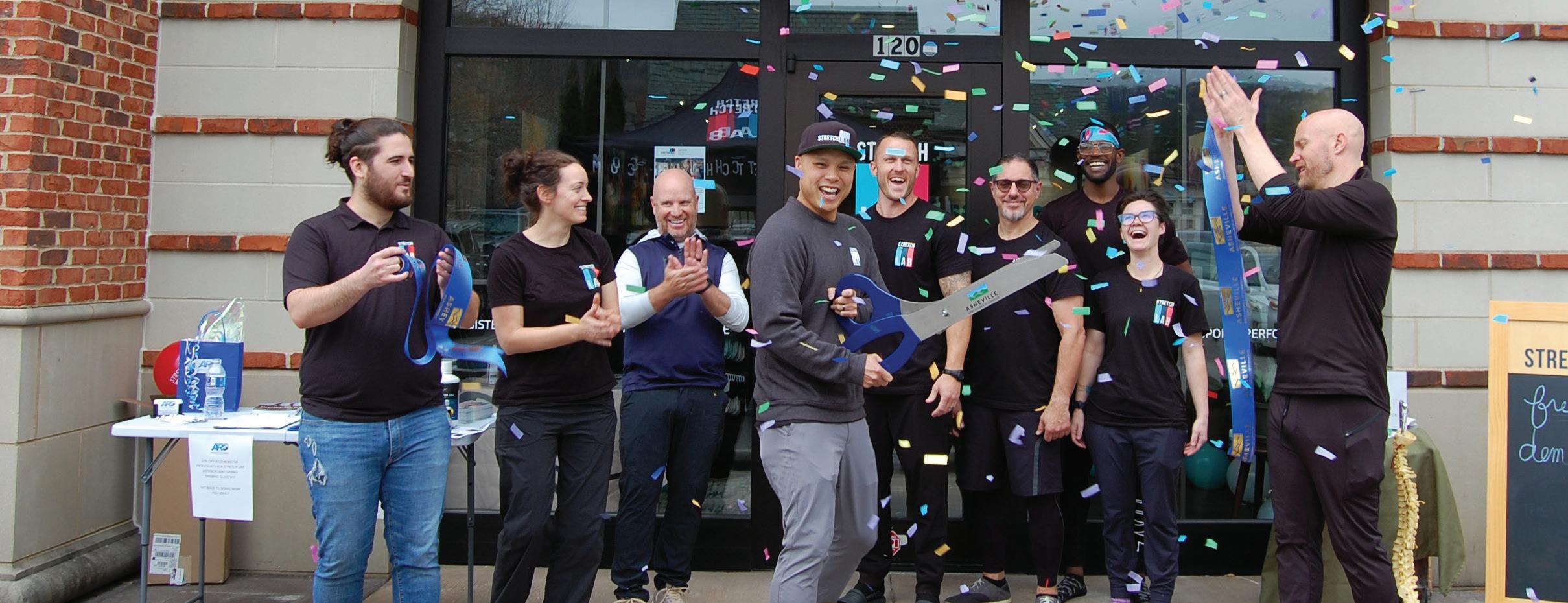
For 125 years, the Asheville Area Chamber of Commerce has been committed to building a stronger community. Our initiatives and projects have stimulated economic development and supported the growth of thousands of local and regional businesses.
Today, we are the local champion for a balanced, thriving economy and connect businesses, large and small, to the resources they need to be successful.
We believe that together, we are more.
Discover all the ways the Asheville Chamber can grow your business and your community at: www.ashevillechamber.org
CELEBRATE:
THRIVE:
CONNECT: Monthly Education & Networking programs

Industry Spotlight: Tourism
14

Industry Spotlight: Craft Beverages & Breweries
32

46
Industry Spotlight: Outdoor Recreation & Summer Camps
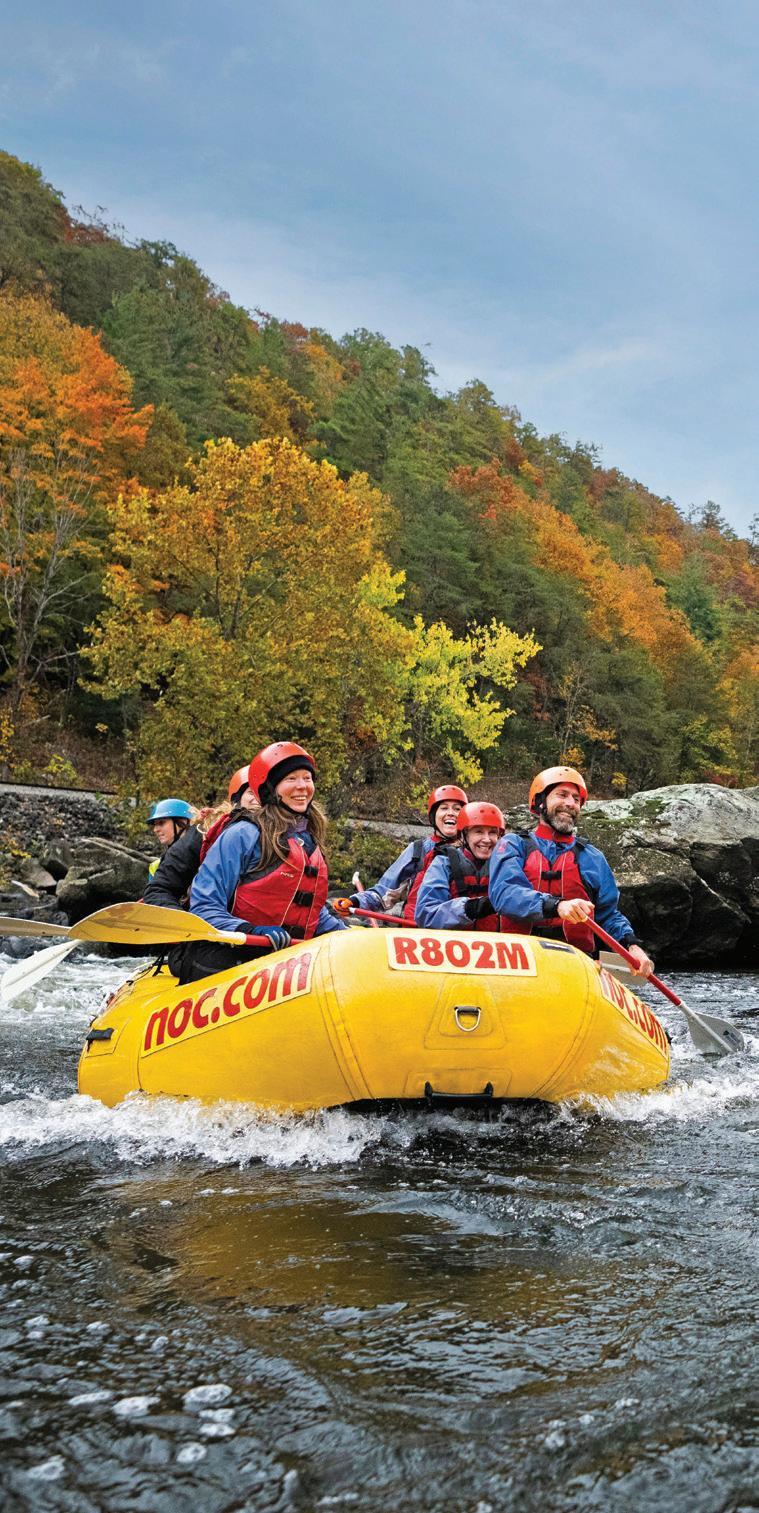
58






Living Roofs, Inc. was recognized as Sustainable Business of the Year by the North Carolina Sustainable Business Council.
AdventHealth Hendersonville announced Asha Oakes, BSN, RN, IBCLC is the winner of the DAISY Award for her remarkable display of dedication and compassion for an elderly patient.

Four Seasons announced their Home Care Team received the 2024 Best of Home Care – Top 100 Leader in Experience Award from Home Care Pulse, a senior personal care experience management firm, placing 6th in the nation.
The Haywood County Chamber of Commerce was honored with the Accredited Chamber designation by the Carolinas Association of Chamber of
Commerce Executives, a professional development organization.
Economic development organization
The Industrial Commons and its partners have been recognized by the US National Science Foundation and selected as a Regional Innovation Engine.
Amy Brantley, the assistant Henderson County manager, was honored with a lifetime achievement award from the NC Local Government Budget Association.
Searson, Jones, Gottschalk & Cash, PLLC announced that managing partner W. Scott Jones has been recognized by Business North Carolina with selection into the Legal Elite Hall of Fame for litigation.
Sarah Stone joined the Carolina Textile District as the Skilled Training Education Manager.
IFB Solutions has promoted Grant Weathers to Low Vision Services Manager to oversee its Community Low Vision Centers in Asheville and WinstonSalem.
The Southwestern Commission welcomed Coley Bartholomew as its newest Project Manager.
AdventHealth Hendersonville welcomed Bo Caldwell, MA, Ed.S. , as its new Foundation Director.
Brought to You By:

Haywood County announced the appointment of Elizabeth Flagg as its new Recreation Director.
AdventHealth announced Larissa Bright, RN, BSN has been named Director of Medical Surgical Nursing at AdventHealth Hendersonville.
Roberts & Stevens announced attorney Gracie K. Paulson is now a partner with the firm, and Cindy M. Rice also joined the firm as a partner.
AdventHealth announced Josh Darling, MSN, RN has been named Director of the Emergency Department at AdventHealth Hendersonville.
The NC Small Business and Technology Development Center announced Ariana Billingsley as its new Deputy State Director.
Colton Groome announced Todd Burkhalter has joined its team of financial advisors.
Mountain Community Health Partnership announced the acquisition of 105 acres for its Spruce Pine expansion project.
Members of their staff and the construction team of Baldwin and Phillips Construction broke ground at the future address of Blossman Gas in Sylva. The 4,000 square-foot project is estimated to be completed in late 2024 or early 2025.
Champion Credit Union will hold a groundbreaking ceremony in April in advance of its new administrative office building’s location at 275 New Clyde Highway in Canton.
The Art League of Henderson County announced the grand opening of The Stuart Glassman Clay Studio at Art Place.
Studio J Medical Aesthetics, Wellness, IV Therapy, PLL C announced its grand opening in Waynesville.
Brevard-based SylvanSport expanded its camping trailer line with the new GO Off-Road.

Advanced Dermatology & Skin Surgery, PA opened a Hendersonville location after operating in Asheville for more than 20 years.
The Jackson County Chamber of Commerce announced the grand opening of its new member Peacock Reserve .
American Dream Home Mortgage, Inc. expanded its Tampa-based business to Hendersonville.
Nine Mile announced the launch of their brewery with the release of five new beers, now available at all three Nine Mile locations (Montford, West Asheville, and South Asheville).
Tee 2 Green Indoor Golf opened in Blowing Rock at Shoppes on the Parkway.
Optimum Retail opened a new space in Downtown Hendersonville.
Grounded Coffee Shop & Deli announced its grand opening in Marion.
Caldwell Community College and Technical Institute and professionals with Morganton Eye Physicians, Graystone Eye and Western Carolina Eye Associates have recently partnered together to offer new pre-apprenticeship and apprenticeship programs for students interested in entering the field of ophthalmology.
Dogwood Health Trust announced its partnership with the Historic Shiloh Community Association along with the WNC Bridge Foundation in support of the Shiloh community.
Blowing Rock Tourism Development Authority is partnering with Black Folks Camp Too to ensure that the outdoors and camping can be experienced and enjoyed by everyone regardless of race, age, or gender.
Mountain Connections celebrated five years of leasing offices for health and wellness professionals in West Jefferson.
Patricia Farmer, RN celebrated her retirement from Haywood Regional Medical Center.
Ernest Co-Warehousing and CoWorking celebrated its first anniversary.
Jackson County Chamber of Commerc e celebrated the 25th work anniversary of Executive Director Julie Spiro Donaldson.

Noble Pest Solutions is celebrating its 5th anniversary serving Western North Carolina.
Founded as Asheville Angels, VentureSouth Asheville announced its official rebrand in a celebration of a decade of innovation and investment.
Poppy Hand-Crafted Popcorn announced a brand refresh and a trio of brand-new flavors to celebrate their 10th anniversary.
Go to WNCBusiness.com/ SubmitNews to submit it.
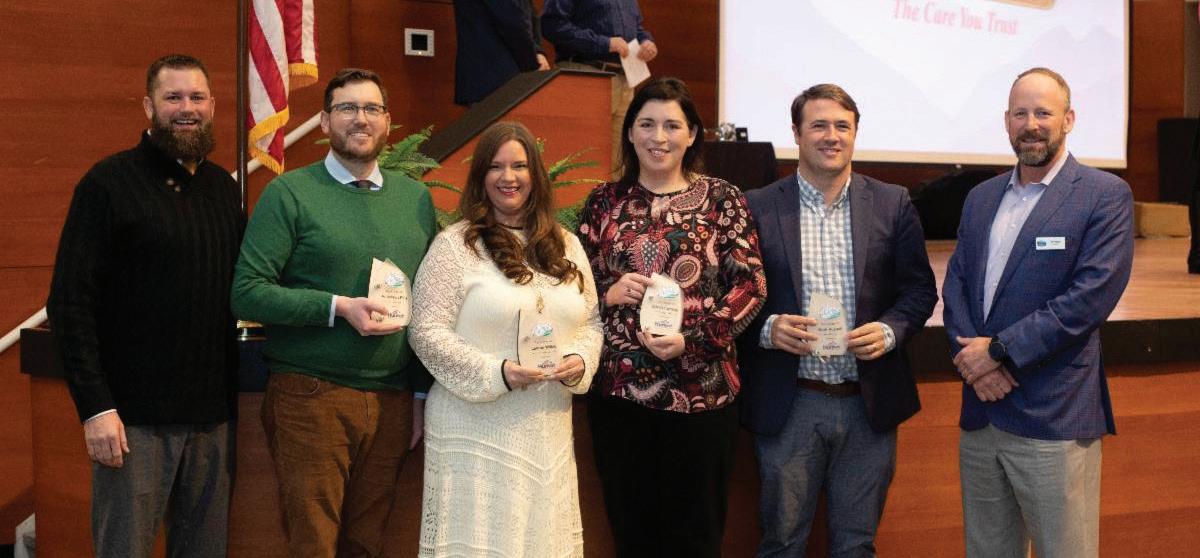
The Henderson County Chamber of Commerce celebrated its 101st Annual Dinner and Awards in January, celebrating individuals, organizations, and businesses for their achievements in and around the Hendersonville community. Awards and their recipients include:
Van Winkle Law Firm
Serving as President of Henderson County Bar Association and actively participating in community initiatives, Anderson Ellis is praised for his natural leadership skills, strong work ethic, and love for the community.
With Lauren Wilkie’s transformative leadership, Safelite has seen remarkable strides, doubling the operating budget and implementing innovative programs to better serve survivors.
As a mentor and advocate for educational advancements, Sarah Swanzy’s leadership extends beyond her official role, making her a true influencer and shaping the next generation of learners.
Southern Alarm Security
Mark Russell’s multifaceted contributions showcase not only his business acumen, but also his genuine commitment to making a positive impact in the lives around him.
ALLCHOICE Insurance
More than professional achievements, Cheyenne Mathews is praised for her natural leadership skills, strong work ethic, and embodying the true spirit of community.
Kyle
Kyle and Amy Lynn Holt have not only achieved remarkable business growth, but have also significantly invested in their community by creating jobs and fostering a positive work environment.
Victoria Dunkle and Bo Caldwell
By consistently going the extra mile to ensure that each person feels seen, heard, and cared for with the utmost compassion, the team at AdventHealth has set a benchmark for excellence in efficiency while never losing sight of the human touch that defines remarkable customer service.
David Stegall
Blue Ridge Community College serves as an inspiration for educational institutions and businesses throughout the community. Its dedication to sustainability not only aligns with its values, but also sets a high standard for environmental stewardship.
Sierra Nevada Brewing Company
Stan Cooper is a visionary, and his commitment to sustainability set an example for the entire industry through his leadership.
Megan Landreth and Alan Yeck
With a mission to enhance the mental, emotional, and physical well-being of veterans and their families, Veterans Healing Farm’s therapies and programs showcase their dedication to creating sustainable models that empower veterans with a renewed sense of purpose and food security.
Chuck McGrady’s genuine compassion and approachability through his years of public service and environmental stewardship made him not just a representative, but a true public servant — one who listened, understood, and acted on behalf of the people he served.
Rebecca McCall
Henderson County Commissioner
With a career spanning more than four decades, Commissioner McCall’s remarkable contributions made with resilience, determination, and dedication will leave a lasting impact on Henderson County.
Dave McGlashan
Adventure Treks
An effective public policy advocate for the youth summer camp and outdoor recreation industries, Dave McGlashan is not only a leader in the youth camp industry, but a visionary who consistently inspires and elevates those around him.
Town of Laurel Park
Carey O’Cain is a passionate advocate for community, a devoted family man, and a tireless worker for the improvement of Hendersonville. He inspires many to embrace the principles of active citizenship and collaborative community building.
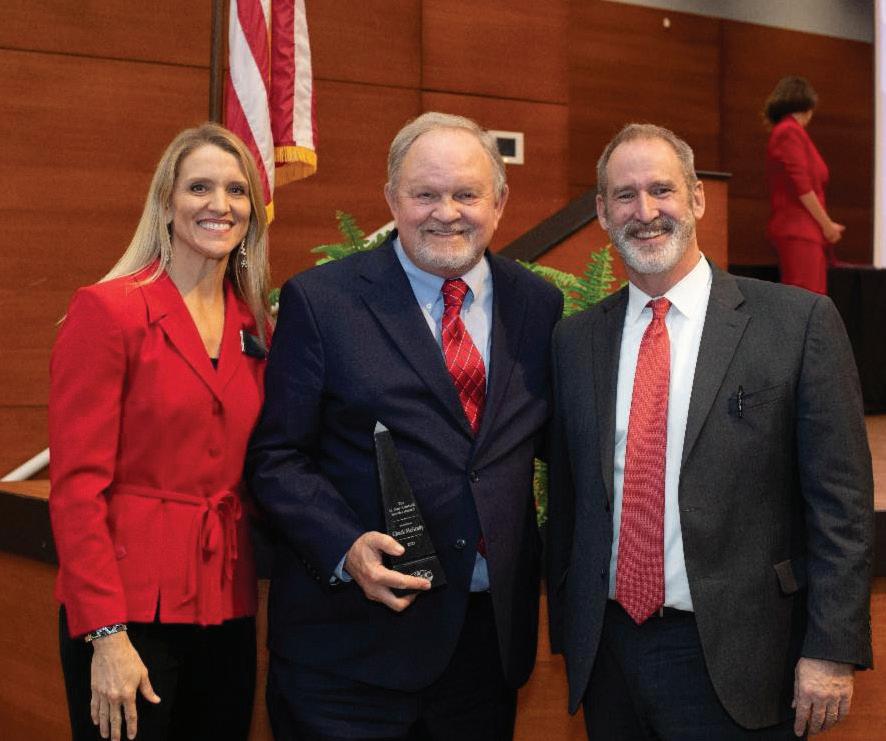
ASHEVILLE - Dogwood Health Trust recently awarded more than $15 million in multi-year funding grants to support organizations that provide high-quality, evidence-based out-of-school-time programs, with an emphasis on supporting all young people, especially those most frequently underserved. The grants were made to 47 organizations and institutions across the region and will serve young people in every county throughout the 18 counties of Dogwood’s service area and the Qualla Boundary.
Source: Dogwood Health Trust
The Industrial Commons and Burke Development, Inc. Create New Workforce Development Program
MORGANTON - Work in Burke, a collaborative initiative between The

Industrial Commons and Burke Development, Inc., launched J.E.T. (Jobs, Education, and Training). The J.E.T. Program is designed to help address the needs of Opportunity Youth, defined as young people ages 16 to 24 who are not enrolled in school or employed. As of 2019, 22% of 16 to 24-year-olds in Burke County qualified as Opportunity Youth. This demographic often faces barriers to maintaining employment or seeking post-secondary education and becomes disengaged with their community. This initiative will provide a structured pathway toward sustainable employment by offering comprehensive training, mentorship, job placement assistance, and professional development opportunities.
Source: Work in Burke
HUDSON - The Duke Energy Foundation has awarded a $40,000 grant to the
Foundation of Caldwell Community College and Technical Institute in support of the college’s Electrical Lineworker program. CCC&TI was one of 11 North Carolina community colleges to receive funding as part of Duke Energy’s $350,000 investment to create a pipeline of skilled lineworkers to help meet the energy industry’s future workforce needs.
Source: Caldwell Community College & Technical Institute
CHEROKEE, MURPHY - Caesars
Entertainment, Inc. announced its premier sports wagering platform, Caesars Sportsbook, became the first sportsbook to launch legalized mobile sports betting in the state of North Carolina. Made possible under the Indian Gaming Regulatory Act and through Caesars’ expanded relationship with the Eastern Band of Cherokee Indians, the Caesars Sportsbook app is now exclusively accepting mobile sports bets at Harrah’s Cherokee Casino Resort in Cherokee, NC,
The North Carolina Department of Commerce awarded business services grants to 14 local workforce development boards, totaling $490,000. Workforce boards will use the grants to convene local and regional partners and employers, and to plan and develop strategies and initiatives for evidence-based, in-demand industry sector partnerships to meet the needs of businesses in subsectors of Advanced Manufacturing, including those focused on clean energy. The local Workforce Development Boards receiving a $35,000 grant include:
• Foothills WDB (Cleveland , McDowell , Polk and Rutherford Counties)
• High Country WDB (Alleghany, Ashe , Avery, Mitchell , Watauga , Wilkes and Yancey Counties)
• Southwestern WDB, in conjunction with MountainWest Partnership (Cherokee , Clay, Graham , Haywood , Jackson , Macon and Swain Counties).
Source: NC Department of Commerce
Harrah’s Cherokee Valley River Casino & Hotel in Murphy, NC and on surrounding Eastern Band of Cherokee Indians tribal lands.
Source: Caesars Entertainment
HENDERSONVILLE - The Appalachian Regional Commission announced approval of a grant in the amount of $367,182 to Blue Ridge Community College to support their ‘Expanding Electric Vehicle Infrastructure in Western NC’ project. With resources provided by both ARC and the College, project funding will total over $734,000. The initiative will address the critical training needs for electrical vehicle mechanics, charging station maintenance, and first responder safety protocols.
Source: Blue Ridge Community College
SYLVA - The Main Street Sylva Association announces the launch of their new website which includes more local resources and information with tools to automatically include content, events, and information from participating local businesses. Moving forward, MSSA intends to help small businesses use the tools included to simplify marketing on their own websites, social media, and beyond. The new website will help local merchants connect to each other and the community.
Source: Main Street Sylva Association
continued on next page

The Appalachian Regional Commission awarded an ARISE grant of $496,500 to Invest Appalachia, Inc. This project will develop a comprehensive five-year implementation plan to support 165 underserved communities in regions including WNC to redevelop their downtown areas. Plan elements include capital access products, technical assistance, a co-developer model, and state-specific strategic plans. With support of project partners and $215,000 in matching funds, this nine-month project will result in the creation of one comprehensive implementation plan.
Source: Appalachian Regional Commission
Following the commencement of the largest construction project in Asheville Regional Airport's history, the airport marks another record-breaking year, showcasing continued double-digit growth. In 2023, 2,246,411 passengers traveled to or from AVL, a 22.2% increase over 2022 figures, catapulting the airport's annual passenger count beyond the 2 million mark for the first time. The growth in 2023 can be attributed to several factors: airlines actively expanded their offerings, local travelers demonstrated a strong preference for flying from their regional airport, and the region's prominence as a nationally-recognized travel destination played a pivotal role, with Asheville Regional Airport positioned as the gateway for many of the region’s visitors.
Source: Asheville Regional Airport

At the February meeting, the Golden LEAF Board of Directors awarded $8,510,465 to support 13 projects through the CommunityBased Grants Initiative in the Piedmont-Triad Prosperity Zone and $1,225,000 to support five projects through the Open Grants Program to increase the number of available, publicly-owned industrial buildings as well as support workforce preparedness and agriculture. WNC projects include:
• $40,000 to Ashe County to develop a preliminary design plan to construct a 30,000-square-foot shell building located at the Ashe County Industrial Park. The County expects that construction of a shell building could attract a business that would invest $3,000,000 in private capital and create 30 new jobs with an average annual salary of $40,000.
• $200,000 to Appalachian State University in Watauga County for equipment for the learning lab to support establishment of a twoyear, entry-level Master of Science in Occupational Therapy program.
Source: Golden LEAF Foundation
NANTAHALA - Nantahala residents will soon benefit from a $50,000 Digital Inclusion grant provided by the Southwestern Commission. The money covers the installation of public wifi in five facilities. As broadband continues to be a priority for regional leaders, Macon County is leveraging those grant dollars with local dollars of its own, chipping in to expand broadband in the Nantahala community.
Source: Southwestern Commission
BAKERSVILLE -Mitchell County Schools announced the new Mitchell Elementary/ Mitchell Middle campus will open in August of 2024. Vannoy Construction, Cope Architecture, and various subcontractors are involved in construction. The new state-of-the-art facility will provide smooth transitions for staff and students while offering an improved space in which to learn and work.
Source: Mitchell County Board of Education
COLUMBUS - Through the Streamflow Rehabilitation Assistance Program funded by the state, in collaboration with the local Soil and Water Conservation District, Polk County waterways, including the Upper Green, Lower Green, and North Pacolet rivers, along with White Oak Creek, will continue to be cleared. This funding was allocated to continue projects of clearing vegetative debris from blocked sites throughout the County, thereby protecting and restoring the integrity of the county’s drainage infrastructure.
Source: Polk County Local Government
Rutherford County Commissioner Benfield Attended National Conference
RUTHERFORDTON - Commissioner Michael Benfield attended the National Association of Counties Legislative Conference in Washington, DC in February. The conference brings together nearly 2,000 elected and appointed county officials to focus on federal policy issues that impact counties and local residents. This conference not only allows meeting with members of the 118th Congress, but is an advocacy opportunity to strengthen intergovernmental partnerships for years to come.
Source: Rutherford County Government
Watauga County
BOONE - The Watauga Economic Development Commission unanimously adopted a resolution in support of myFutureNC’s goals for Watauga County at their January 2024 meeting. The resolution states the Watauga EDC supports and endorses myFutureNC’s state-wide attainment goal that 2 million North Carolinians should have a highquality credential or postsecondary degree by 2030. The resolution also supports the local adoption of myFutureNC’s educational attainment goal of 13,384 individuals with a high-quality credential or postsecondary degree by 2030 in Watauga County. The Watauga EDC pledged to work along with leaders in education, business, state and local government, and community organizations to continue to foster collaboration to achieve the goal by developing an action plan, defining success with measurable outcomes, executing on the action plan, and sharing successful practices with myFutureNC and peer communities.
Source: Boone Area Chamber of Commerce
In an effort to improve infrastructure, walkability, and aesthetic appeal to Hendersonville’s 7th Avenue district, The City of Hendersonville’s Seventh Avenue Streetscape Project is underway.
“The 7th Avenue Streetscape project has been in the works for several years, with initial discussions and concepts starting in 2017 as a part of our Downtown Workplan,” Downtown Manager Jamie Carpenter said. “In 2018, the Maple Street improvements completed by the City's Public Works Department were the initial public investment into the district, creating better sidewalk accessibility and parking on Maple Street. This led the way to the Hendersonville Farmers Market opening in 2020. Produced by the Friends of Downtown and the City's Downtown Division, the Farmers Market has brought new attention to the district, with an increase in approximately 44,000 visitors to the district every year.”

In preparation of a “Main Streetlike” experience, Carpenter said the streetscape idea has already attracted investment and development of new businesses in the area. Outdoor seating options, landscaping beautification, and improved walkability creates an appealing environment for businesses coming into the area. Since 2020, there have been more than 11 new restaurant and retail businesses in the district, with $1.5 million in private investment.
While 7th Avenue is closed to vehicular traffic, sidewalk access to local businesses remains in place. Many businesses have available parking behind their stores, and public parking is available on adjacent Market Street and Locust Street.
Businesses affected by the streetscape project have joined together to create a ‘Hard Hat’ Popup Market, running every Saturday morning through May, weather
permitting. This market aims to create an extra opportunity for the community to support local businesses during streetscape construction.
Janna Watson, owner at Old Lab Designs & Mercantile on 7th Avenue, said despite the disruption, the increased foot traffic and improved aesthetics will hopefully bring a new vibrance and attract more tourists to the area.
“All of us business owners would have to admit the disruption has been painful,” Watson said. “We are glad it is happening at a time of year when things are already slower. We are grateful that our locals are still supporting us during this time, and hopefully with the renovation of many buildings and the improved aesthetic appeal, more tourists will see the area, think it looks like a cool place, and spend time with the businesses here on 7th Avenue."


Comprising 99.6% of all enterprises in the state of North Carolina, small businesses create a huge impact on every industry and sector. WNC is ripe with opportunities and full of support organizations, and is a region that emanates a collaborative spirit. The increasing number of startups paired with the growth, success, and longevity of so many small companies is testament to how much these businesses mean to WNC’s local communities.
Service Corps of Retired Executives, commonly known as SCORE, is the nation’s largest network of volunteer business mentors who help small business owners establish and grow their companies.
SCORE’s Western North Carolina branch consists of about 160 active clients, with approximately 220 new clients each year. Mentor Michael Dexter-Smith said he sees an uptick with the start of each new year, and each small business is unique and different. Small business owners themselves are varied as well. Mentor Tim Morris said they see a lot of retirees or retired military personnel who have a passion, want a change, and are finally able to do what they want in their career.
There are many young adults coming to SCORE for help as well. Dexter-Smith said there is a generational trend of younger people wanting to work for themselves, or start working for another entity and expand one aspect of it on the side. He sees more women interested in “breaking the norms” and running a business by themselves as well.
“We have seen a lot of younger people starting up,” Dexter-Smith said. “So many people want to do something by themselves, and bring their new ideas to life. Currently, there are a lot of young people moving into the area with a software background, and we typically see them right at the beginning as they’re starting off.”
Mentors are noticing an increase in the popularity of lifestyle businesses. These small businesses are created with a focus on the potential lifestyle offered more than the potential revenue. Some owners want to spend more time with their family, and some have a goal of simply doing what they love, such as gardening, farming, or boarding horses, and people are not afraid to try to get any type of business started.
“Something unique about America is that failure is seen as a learning curve; it’s not an issue,” Dexter-Smith said. “That’s unique to the US. People are encouraged to try anything, and if they fail, they fail, and they are open to adapt and change. Reaching new markets with social media is easier than ever, and people are talking about entrepreneurship more in education. That can be difficult to teach, but more and more people are willing to try. It’s something in your gut.”
Starting a new small business can be tricky, according to Dexter-Smith. Entrepreneurs must consider their career goals, how to fund those ideas, craft a business plan, and create an elevator pitch — a brief overview of their business they could share with someone within the time spent on an elevator.
Owners need to consider early on what they’d like to get out of their business by asking themselves about their ultimate goal - this could be establishing a generational business, starting and selling a business, or scaling and growing. Considering a succession plan and/or an exit strategy is also important for every business.
While the initial startup phase is exciting, many encounter difficulties six to 18 months after opening. The initial enthusiasm can
wear off and sometimes businesses need more money to keep operating, so it can be challenging for small business owners to keep the momentum going.
Some businesses grow rapidly, and Morris said there is no such thing as growing too fast, but the owner must be prepared. There is a risk of putting in too many hours and burning out. Owners may need to seek additional capital, hire employees, or outsource some tasks through contractors. Adapting to growth is key.
Seeking additional capital often happens in a small business’s growth phase, and owners need to have a plan of where to raise money in the future. Businesses can go public to raise funds, seek venture capital, visit a community development financial institution like Mountain BizWorks, or speak to a traditional bank. “Cash flow is often the Achilles heel for growing small businesses,” Dexter-Smith said. “Business owners need good people to help, and they will still need money.”
When it is time to hire employees, Morris said business owners should consider hiring contractors instead of hiring directly. Many people are less worried about things like 401(k)s and people are unsure if social security will be around
continued on next page

when they approach retirement age. Instantaneous rewards seem to be more of a driving force for many.
“Many people are more than happy to work on a contract basis,” Morris said. “A lot of people are thinking more short-term in terms of jobs. Small businesses often can’t afford to pay health benefits, and nowadays there are other ways people can access benefits rather than exclusively through their employer.”
SCORE is about helping small businesses at any stage, during startup, growth, or simply getting through a challenging time.
“We see bigger companies who are struggling a bit coming to SCORE for mentoring,” Dexter-Smith said. “They are looking for direction on where their business can be lucrative; how they can deliver offerings with different value propositions and revenue models. We
try to show them different opportunities and be a sounding board for their ideas. We’re not taking money; we’re just here to be the ‘gray hair in the room’.” Morris said though mentors are not employed or contracted with the business owner, they always strive to provide great service and experiences. Mentors offer thoughts and critiques, and a variety of webinars are available on SCORE’s website at SCORE.org or SCORE.org/WesternNC.
Any small business owner, or entrepreneurial-minded individual interested in becoming a small business owner, can meet with staff at their local Small Business Center for direction, mentoring, and other resources. From
the idea stage to those looking to grow an existing small business, Blue Ridge Community College Small Business Center Director Ben Smith said owners are encouraged to reach out for support.
At the idea stage, aptitude resources are available before individuals begin diving into business concepts. Potential business owners may find assessments to help them determine if they are ready to become an entrepreneur, and the Small Business Center can help them prepare if they decide to move forward.
“If they’re ready, we can help them determine what resources and funding may be available,” Smith said. “We’ll help with developing a business model, help look at target markets and demands, and may be able to help entrepreneurs determine if their business model is appropriate after doing their research. We can then provide additional resources and strategies for them to work with if they’re ready.”


The two primary areas the SBC focuses on are classes and counseling. When small business owners are in exploratory mode, they can attend free classes and feel out ideas before their initial counseling session to gain a foundational knowledge. With more than 100 live classes offered by local instructors, the core curriculum of classes is offered multiple times per year and includes topics such as getting started, marketing, taxes, and financing. Other focused niche classes like farming, Quickbooks, AirBnb operations, and mindset are offered from time to time.
Once entrepreneurs begin their small business journey, the SBC can partner individuals with counseling services. Mentors can help individuals find the support services they need to get their business off the ground, including connecting with people like business attorneys, branding experts, CPAs, and SEO experts.
“These resources can get very specific,” Smith said. “While we cannot do the work
“What’s unique about the Asheville community is people genuinely want to help. The whole ecosystem is strong because there is so much collaboration, and there’s no shortage of talented, smart, interesting people.”
for the entrepreneur, our counselors can offer advice and referrals to a variety of experts.”
Small business owners looking for support can find a Small Business Center in each of North Carolina’s 100 counties. They exist at local community colleges and satellite locations, ensuring everyone in North Carolina has access to an SBC within 30 minutes of them, according to Smith. While offerings may vary from Center to Center, the core of each is the same — classes and counseling.
Small Business Centers can benefit growing businesses in addition to startups. When small businesses approach their growth phase, owners can speak to SBC counselors and mentors about how to hire their first employees, what systems need to be in place in preparation, how and where to post jobs, as well as tips for recruiting and interviewing.
There are classes available for businesses in the growth phase as well. Offered through the Blue Ridge Community College, the Mission Acceleration class is for established businesses ready to scale. Classes are also available for marketing which are applicable to most small business owners, sharing steps that need to be taken for their small business to grow and increase revenue.
Other services the SBC may offer include incubators — a full-scale suite of services, spaces, and/or capital funding to help businesses grow. At the Small Business
Center at A-B Tech’s Enka location, food or beverage businesses can reach out to Blue Ridge Food Ventures, which provides infrastructure and technical product development assistance to help these businesses expand their offerings. Other incubators and further resources may be found at other Small Business Centers
around the region and the state.
Smith said similar advice, resources, and services are provided to businesses across a variety of industries. After several years of uncertainty, one key thought small business owners should consider is diversification.
continued on next page

“You never know what the economy or the pandemic may do,” Smith said. “There are always unknowns, so you need to have a contingency plan. Think about diversification of your product or service, and the channels you have to promote them. Maintain savings to cover at least a couple of months, know where to access capital, and have a line of credit that is possible to use. Be careful about using those funds, but keep an option in your back pocket.”
Originating in 2021, the Hendersonville Farmers Market Young Entrepreneur Program helps support young makers who want to sell their products at the local farmers market.
Dakota Parker, Hendersonville’s Downtown Events and Marketing Assistant, and Terry Jacobs, the City’s Downtown Event Coordinator, work together to help make this program known to the area’s youth as well as help the youth find success in their ventures.
The Hendersonville Farmers Market opened in 2020, and Parker’s predecessor realized that due to COVID, people were spending more time doing crafts. Also understanding that the ages between six and 17 years old are an important growth period, the program was developed with the goal of allowing young people to develop social and business skills while using their talents to create products.
“This was a time where everyone was texting or on social media, and there was not much one-on-one, face-to-face interaction,” Jacobs said. “This program helps kids develop people skills and communication skills, learning the social aspects of participating in the community. I love seeing the kids interact and sell their products. They have a lot of zeal and a go-get-it attitude. They’re the greatest.”
Since the program began, 10 young entrepreneurs have participated in the Market. These youth began with a hobby, and like any entrepreneur, some of them became very serious. Not only have they learned about integrating with the world, according to Parker, they have built brands for themselves.
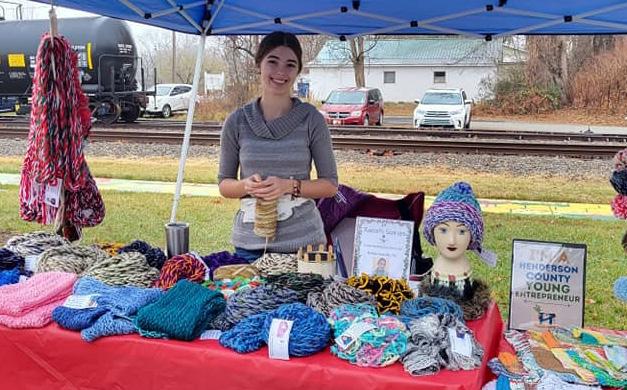
“They come to us with their passion; they’re not recruited,” Parker said. “They have an idea and a craft and want to take it to the next level.”
A lot of support comes from the parents of these young entrepreneurs, but each participant is vetted to make sure the children are the ones making the product. They are also the ones talking to market visitors and handling sales transactions.
Participants’ products cover a variety of items, including Rachel’s Scarves, Mama Llama Freeze Dried Candy, Kassandra Grace Candles, Willa Crochets, A Piece of Maine whoopie pies, and Raymond’s Forge — a young blacksmith.
These participants are held to the same standards and rules of any market vendor. They must bring quality items, arrive early, and stay for the six-hour window the market is open. Jacobs and Parker say these children are happy to rise to these standards and quickly get used to that environment.
“It’s a big commitment, and these kids are very business-minded,” Jacobs said. “They take it very seriously, and we get the feeling that it’s way more than a hobby. They are grateful for the opportunity to be here.”
Participants are learning a business practice. They are charged a manageable entry fee, then keep their earned revenue and learn the value of their products. Many see this opportunity as a business incubator, and they are surrounded by role models, some of whom have started their business at the Market, grown, and moved into their own brick-and-mortar location.
When young entrepreneurs age out of the program, they, like other market vendor businesses, can work closely with Blue Ridge Community College’s Small Business Center to boost their business. This office offers a plethora of information and guidance, and if Jacobs and Parker can make connections or offer any help, they are happy to do so.
continued on page 20

As a former professional ballet dancer, Jessica Adams has flourished in her career as a Real Estate Broker at Orchards Properties with an attention to detail and work ethic that makes her clients confident in any transaction with her on their side. Whether it is performing a CMA to figure out the target list price, or finding the perfect fixer-upper or a beautiful piece of land to build your dream home on, she truly enjoys every opportunity to surpass her client’s expectations with her professionalism and abilities. Jessica believes that in order to be a true advocate for her buyers and sellers, communication is the most important thing. She always prioritizes updates, timely replies and availability.
341 North Main St. | Hendersonville
951-990-0321 (Cell)
828-844-1234 (Office)
Jessica@OrchardsProperties.com

This is the place to find that perfect gift for anyone who loves outdoor sports. Check out their Buck, Kershaw and OutDoor Element Knives. They offer Thompson shooting targets, KleenBore cleaning kits, guns and ammo. They have target rounds as well as home defense rounds in the most popular calibers. No limits, buy what you need. Mention this ad for 10% off one box of ammunition.
118 5th Avenue W | Hendersonville
828-329-1057
BigFootAmmoStore.com




BigFoot & More.
Your LOCAL Apparel Branding Experts, keeping your logo visible everywhere you go. Big Frog will find the right solution for your brand, style and budget. Branded apparel is a cost-effective way to market and grow your business with 100% Return on investment.
• Screen print, Embroidery, Direct to Garment, Direct to Film
• NO minimum order but capacity to print thousands
• Thousands of apparel options in different styles, brands, colors and sizes.
• Promotional products/Hard Goods for all your marketing swag.
• Online apparel stores available to sell merchandise and raise funds.
336 Rockwood Road | Arden
828-209-8100
Asheville@BigFrog.com | BigFrog.com/Asheville


“We want to help them take the next steps to follow their dream,” Jacobs said. “Success is not about a piece of paper; it’s about doing what you love. If you’re willing to go for it, you can do it, and you can be much more successful.”
Most of the Young Entrepreneur Program participants have continued with the program for several years, which Jacobs and Parker say is a testament to their dedication and work ethic.
“They are happy to be there and take pride in their work,” Parker said. “They are putting in the time and the effort, and they love their craft. They have some of the best quality items at the market. They are the definition of the ideal market vendor because they bring that passion and excitement every week.”
Parker said young entrepreneurs interested in participating in the
program can sign up on the website, HendersonvilleNC.gov/Events/ Hendersonville-Farmers-Market, and he also has a goal of working with local schools to boost awareness of the program. His goal is to give more children the chance to turn what they love into a business opportunity.
For small businesses in Buncombe or Haywood Counties that are ready to expedite their growth, Venture Asheville offers a variety of options for support.
Venture Asheville’s Executive Director Jeffrey Kaplan said participating businesses can have just about any type of offering, but they do have several things in common. These entrepreneurs are full-
continued on page 22




Board & Brush Asheville is an instructor-led DIY woodworking experience. Customers go online, pick a date and project, come into the studio and are provided all the materials and instruction for them to complete a home decor project all while enjoying time with their family & friends. Project choices include wall signs, porch decor, clocks, trays, coat racks, porch planters, and more! Team building, customer appreciation, birthday parties (kids & adults), bachelorette parties, kid’s camps and fundraisers are a sampling of private events they offer in studio in addition to public events. They can also bring the excitement to you with B&b Brought to You, an off-site modified workshop in your place of business, school, church or community center. Look no further than Board & Brush for the ultimate event that is sure to leave a lasting impression!
1011 Tunnel Rd. Suite 120 | Asheville | 828-974-8733
Asheville@BoardAndBrush.com | BoardAndBrush.com/Asheville/

Carrie Ann Chandler is an engaging Realtor® with EXP Realty LLC. Greeting the community and her clients with Hello Friends!, she has the mission to help folks from all walks of life with their real estate needs in Western North Carolina. Carrie Ann fulfills this mission with compassion and professionalism. She serves all of Western North Carolina. Carrie Ann has a unique connection to the area spending most of her summers here as a young girl. She will help you explore the community and surrounding towns. Give her a call today or learn more about Carrie Ann by visiting her website.
484-437-6343
CarrieAnn@GuardianWNC.com linktr.ee/HelloFriendsCarrieAnn
Located in Downtown Hendersonville beside the parking garage on 5th Avenue. One hour of free parking included. Fins on Fifth offers salt and freshwater fish, axolotls, frogs, turtles, chameleons, geckos, crested dragons, uromastyx, snakes, pythons, tarantulas, bunnies, hermit crabs and more. Your child’s first pet ought to be a good experience and learning responsibility starts small. Come visit the store and their staff will not only help you select the right pet, but teach you and your child how to care for it. Mention this ad to receive 10% off one regular priced animal (excludes Sugar Gliders).
118 5th Avenue W | Hendersonville 828-329-1057
FinsOnFifth.com
time founders operating highly scalable businesses. They must be coachable, tenacious, and very committed, and make it through multiple rounds of screening to be able to participate. These small business owners are those that are thinking about long-term revenue, market availability, and growth potential.
There are three new incubator programs within Venture Asheville that offer support and resources for different types of businesses in different stages of growth:
Insight — Designed for a servicebased company, participants are almost exclusively solopreneurs who are members of the Asheville Area Chamber of Commerce. Businesses include a recording studio, an authenticity and intuition coach, and a ghostwriter. This program was created with the intention of sharing services with Chamber members,
which some said was an overlooked part of the membership that is now fulfilled, and offers a new potential entry point for some small businesses.
Elevate — Offering five components of support including mentorship based on MIT Venture Mentoring Service, participants’ metrics have produced $110,000 in annual revenue with an average of $86,000 annual salary, raised $58 million in capital, and created 384 jobs.
In addition to expert mentorship, peer mentorship via monthly luncheons, workshops, and trainings builds an intentional community of like minds. The E13 and Experience portfolios provide metrics showing in what areas entrepreneurs are strong or weak, and help to provide a roadmap for the experiences a founder should have including public speaking, being a thought leader, applying

for funding, and volunteering.
Kaplan said it is also necessary to have a hobby.
“A hobby is so important because most small business owners are so wrapped up in their business, the rates of burnout are very high,” Kaplan said. “You must have multiple facets in your personality to hit the next phase of your business. If you’re always in ‘fight or flight’ mode, you’ll be reactive, not responsive, and that’s not productive.”
Inspire — Launched in February 2024, this program is designed to bring luminaries to the table and sustain excellence in the area’s growing businesses. Participants are primarily entrepreneurs who are beyond the initial growth curve of their business and seek further collaboration, peer mentorship, metrics tracking, and other support.

Run by Venture’s partners at Hatch Innovation Hub to complement the incubator programs, Pressure Tests serve small businesses looking to elevate their initial growth curve. While the Elevate program typically spans two years, Pressure Tests are a 30 to 90 day critical experiment working on one specific need.

“If Elevate is a road trip, when you get a flat tire, Pressure Tests fix that tire,” Kaplan said. “Elevate looks at milestones over a months-long period; less about a specific industry and more about milestones. Pressure Tests pair small business owners to a mentor with specific knowledge to tackle a specific challenge.”
Venture Asheville also hosts an annual Entrepreneurship Summit with a different topic each year, responding to what data says the market needs at the time. The goal is to inspire people with the right mindset to perform entrepreneurial work in any context and in any aspect.
Many Venture Asheville participants acquire the help of investors to boost their growth; some investors are seeking continued on page 24



Laura has been a Real Estate Broker for 17 Years, 15 in Henderson County. Currently the owner of NextHome WNC Realty. Licensed in NC, SC & CA. She focuses on the disposition and acquisition of single family homes, raw land & commercial properties. Utilizing cutting edge branding, industry leading technology and comprehensive marketing with a National presence. Their vision is to foster a collaborative, supportive working environment while maintaining the highest standards for continuing education, staying abreast of industry trends & nonstop market research.
147 4th Ave. West, Suite B | Hendersonville 828-329-9397 (Cell) | 828-785-5535 (Office)
Laura@NextHomeWNC.com
NextHomeWNC.com

Your premier Medical Spa in Asheville and Hendersonville NC, Harpe Laser & Wellness provides world class services to boost your confidence, wellbeing, and vitality at any age. They value experience, expertise and exceptional care, maintaining your safety and satisfaction as their top priorities. They are committed to customized services providing natural results, aligned to your aesthetic goals and budget, within a caring and respectful environment. They believe in a holistic approach to skin health and rejuvenation that incorporates many factors that help you reach your goals and improve wellbeing. It is their honor to partner with you on your journey to looking and feeling your best.
5 Yorkshire Street, Suite B | Asheville | 828-435-2352
306 White Street, Suite C | Hendersonville | 828-595-3113
DrHarpe.com

Hendersonville Outfitters is a fly fishing and tackle shop located in downtown Hendersonville that offers guided trips and quality gear for all skill levels. Owners David Bergman and Ambre Mehenni take pride in teaching and having an open approach to the sport. The guides are not just there to put you on fish, but educate you so you have confidence on the water. In addition to fishing related items, they also have local nature based art and are supporters of the local art community. All anglers are encouraged and welcome to see Hendersonville Outfitters as a haven for those who experience the great Outdoors with rods in hand. Located on 3rd Avenue West is a short walk to start your adventure in the great sport of fly fishing.
144 3rd Avenue W | Hendersonville 828-595-3550
HendersonvilleOutfitters.com

small business partners, and others are approached as a potential match for a specific business. Kaplan said the Venture Asheville team knows what investors like to see, and they do their best matchmaking possible.
“Capital is hard earned, and easily lost,” Kaplan said. “These partnerships require a ton of trust for both the entrepreneur and the investor, and this happens through deep relationships on a personal and professional level.”
While Venture Asheville programs are selective of their participants, Kaplan said any small business owner looking to grow and scale can always reach out to the Venture team. Even if these programs cannot help your business directly, leaders at Venture Asheville and Hatch Innovation Hub are happy to talk and connect where
it is possible. New programs can always be created in the future, so it is helpful to know what the small business community has. For example, Kaplan said Venture Asheville is working with partners to add a new program to its suite of offerings focused on those with long-term, ambitious startups that have a significant focus on education and venture development.
“Don’t be shy; tell people about what you’re doing,” Kaplan said. “What’s unique about the Asheville community is people genuinely want to help. The whole ecosystem is strong because there is so much collaboration, and there’s no shortage of talented, smart, interesting people. The ethos here is that there is such an appreciation for creative, hard working people, and that nurtures and supports entrepreneurs who live and breathe that.”
Small business can be all about who you know, and one way to get to know the right people to conduct business with is by becoming a member of your local chamber of commerce. According to Henderson County Chamber of Commerce Operations Manager Amy Muniz, chamber membership can help boost small businesses.
Chamber participation can serve many purposes. Some small business owners join for support in starting their new business, and some join to learn how to grow in services offered or the number of employees they have. Educational business workshops and resources are
continued on page 26

As




Over 64,000 client visits and nearly 2,000 showers since the Day Center began in 2011! Did you know that in addition to offering emergency overnight shelter to individuals and families who are experiencing homelessness in our community, the Hendersonville Rescue Mission (HRM) specializes in long-term programs that help people overcome barriers to housing and achieve success in remaining housed. At HRM they believe that structure and accountability are vital to achieving long term success in any endeavor. They offer the basics: food, clothing, and a clean, warm bed to sleep in overnight, but their housing readiness program also offers the opportunity for lasting change.
PO Box 1512
Hendersonville, NC 28793
828-697-1354
HendersonvilleRescueMission.com

Are you struggling to make your brand stand out and resonate with your audience? Traditional swag and branding efforts often fall short, leaving your events unnoticed and your brand’s potential untapped. At Hornsby Creative, we blend strategic purpose with elevated brand engagement, transforming ordinary events into memorable experiences. Imagine your brand not just seen, but felt and remembered, with stories that stick, merchandise that matters, and experiences that echo. Get your hands on our Summit Seeker Strategy Workbook for FREE – your next step in blazing the trail to seize new opportunities. Plus, when you’re ready, dive deeper with a complimentary Micro Strategy Session to map out the paths to your brand’s new horizons. Ready for efficient, authentic, and empowering growth? Reach out today.
828-407-0487
HornsbyCreativeGroup.com
Located in Downtown Hendersonville, LazyOne offers a great selection of matching family pajamas and underwear. Stop by their store and view their cozy, quirky and fun items. Want to bring your family together with a matching pajama set? Figure out onsie sizes for everyone (including your dog), visit their store, and their staff will help you select a matching set for your whole family. They can also help you pick out something special for friends or family members. Mention this ad to receive 25% off one regular priced item.
501 N Main Street | Hendersonville
828-513-0076
LazyOneOfHendersonville.com

offered by many chambers, and chambers also help facilitate growth by advocating on behalf of businesses, in areas from public policy to community improvements. Networking events are a large part of many chambers’ offerings. Becoming an active participant in a chamber of commerce can create relationships, encouraging warm leads, and helping generate new business. The variety of networking events offers great ways to meet new people, and Muniz said there are a variety of special-interest networking groups in Henderson County in addition to the regular networking events which include:
Business After Hours — Business After Hours is the Chamber’s premier networking event and the best chance to make valuable connections to build your business.
AM Power Hour — For early birds, this event is an opportunity to find a strong referral source, a new vendor, the perfect client, or simply get a foot in the door for connecting again later at another Chamber event.
Business Morning Update — This monthly event features several speakers on timely community events and issues affecting our business community.
GROW Mills River — Updates from the Town of Mills River and networking with neighboring businesses.
Young Professionals of Henderson County — The YPHC’s Monthly Social offers a chance for those professionals under 40 to meet through a laid-back networking opportunity.
Henderson County Chamber President Bob Williford said while networking events are a great way to reconnect and get updates from people in the community, it is a good idea to always meet a few new people and expand your network, especially in the beginning stages of a business.
“If you want to be successful, the best way to approach networking events is to go in with a goal,” Williford said. “Some people always talk to the same people, and it’s nice to have strong relationships, but it’s a good idea to meet three to five people you haven’t met before. Developing a network that may lead to more business in the long term is always beneficial.”
Networking events occur regularly, and people are likely to see many of the same facesat the same events. Muniz and Williford agree that consistent attendance is important because while there are many regulars at events like the monthly Business After Hours, over the course of multiple years, the crowd will have changed completely. For example, during a business’s early stages, the owners may be regulars, and four to five years down the road, the leadership team may have

replaced the owners as attendees. New members also join regularly.
“The Chamber has been doing After Hours for years,” Muniz said. “It’s the easiest for most people to attend, and is the best thing for meeting new people and making new contacts. It’s a no-pressure, drop-in event, and attendees are encouraged to bring a friend or a coworker if that makes them feel more comfortable. Once they’ve done it, it’s easier for them to come back again.”
Chamber ambassadors help make event newcomers feel comfortable as well, according to Muniz, and they look for fresh faces at events. Each new Chamber member is paired with an ambassador who will invite them to events, introduce them to community members, and help determine how best they can be served by their Chamber membership.
The Henderson County Chamber also works with other chambers of commerce in the area. Regional networking events are held multiple times each year to allow small business leaders to expand their network into surrounding counties, and Chamber leaders share programming ideas for how they can help their members to be successful.
“The entire region can be more successful if we all work together,” Williford said. In addition to networking opportunities, area chambers of commerce offer events and programs like workshops, resources, pitch parties, political updates, workforce development programs, community initiatives, and more. For more information about Henderson County and other area chambers of commerce, see the Small Business Resource List on page 31.
Business Improvement Districts, or BIDs, are groups of stakeholders, businesses, property owners, and in some cases,
continued on page 28



Marthaler Jewelers is a first-generation, family-owned jewelry store that opened in 2010 with the help of amazing angel investors. Two years ago, they moved to a larger location in Fletcher and their son, Matthew Blair, joined them full-time. His experience as an attorney has been enormously helpful as they continue to grow their custom and manufacturing capabilities. Their incredibly talented team provides CAD for custom design, repairs, appraisals, engraving, hand-fabrication, and more. Their goal was to create a store like no other where they could do everything from start to finish. This gives them the opportunity to ensure that every piece is heirloom quality, created with generational wear in mind.
3578 Hendersonville Rd. | Fletcher 828-676-1625
MarthalerJewelers.com

Pisgah Forest Gem Mine is proud to offer indoor and outdoor gem mining, and is open rain or shine all year long! Find emeralds, geodes, amethyst, fossils, meg teeth and more on their large 65-foot sluice. Satisfying over 30,000 families, this is a great outing and everyone will leave with more than just souvenirs. Visit one of the locations below and buy any bucket and get a Little Nugget FREE ($14 value).
507 N Main Street | Hendersonville
3338 Asheville Highway | Pisgah Forest
828-367-8330
PFGems.com

SCORE provides new and existing businesses with free mentoring and online information to start and improve their business outcomes. As a sister entity with SBA our network of 10,000 mentors in 250 chapters is an invaluable resource for business owners. Sign-up online and let us help you succeed – and it costs you nothing. Since 1964, SCORE has helped more than 11 million entrepreneurs start, grow or successfully exit a business. SCORE’s volunteers provide free, expert mentoring, resources and education in all 50 U.S. states and territories.
SCORE is a 501(c)(3) nonprofit organization and a resource partner of the U.S. Small Business Administration (SBA). Thanks to this generous support from the SBA and the selfless contributions of our dedicated volunteers, we can deliver most of our offerings at no cost.

residents within a defined geographic area that come together and decide to invest in enhanced services. Generally, those services are locally controlled to some extent, and BIDs create a community investing in the enhanced needs of the place in which they live, work, or do business.
BIDs are run by private property or business owners who form a board or nonprofit organization. Stakeholders are the decision makers regarding what services are offered and how funds are administered. The first BID in the country was formed in New Orleans, LA in 1974, and quickly became a popular model. Currently, there are 50 BIDs in North Carolina alone, and leaders within the City of Asheville are considering implementing the model and are working on a BID proposal.
In January, the Chamber of Commerce hosted a panel discussion by Dana Frankel, Casey Gilbert, and Hayden Plemmons to help inform the community about the potential initiative. Each of these women have experience working in a Business Improvement District in other cities, and shared details about their organizations and efforts.
Considered by some to be an investment in their business community, BIDs tend to fare well in economic downturns. The board of directors in control of funds helps
businesses decide how and where to spend the money, giving business owners more control on chosen services. Having a direct line to decision makers can help owners accomplish some goals faster than going through a municipality.
The overarching goal of BIDs is to provide a clean and safe environment in which to do business. While specific services vary from city to city, many BIDs perform services like hosting community events, collecting trash, capital improvements, and beautification projects. Resources for small business support and economic development programs are often included, and advocating on behalf of businesses is also a large part of many BIDs.
BIDs may also market the amenities and opportunities within districts to new businesses or businesses outside of the district. This can help communities fill vacancies and drive more traffic to the area.
A BID’s mission can pivot and shift according to the needs of the community. Depending on the progress of its focused projects, some needs can eventually be determined by stakeholders as no longer necessary, and energy and capital can then be shifted to more relevant projects.
Funding for BIDs comes from an additional tax percentage paid by business owners, property owners, and residents within the defined area. In addition, event
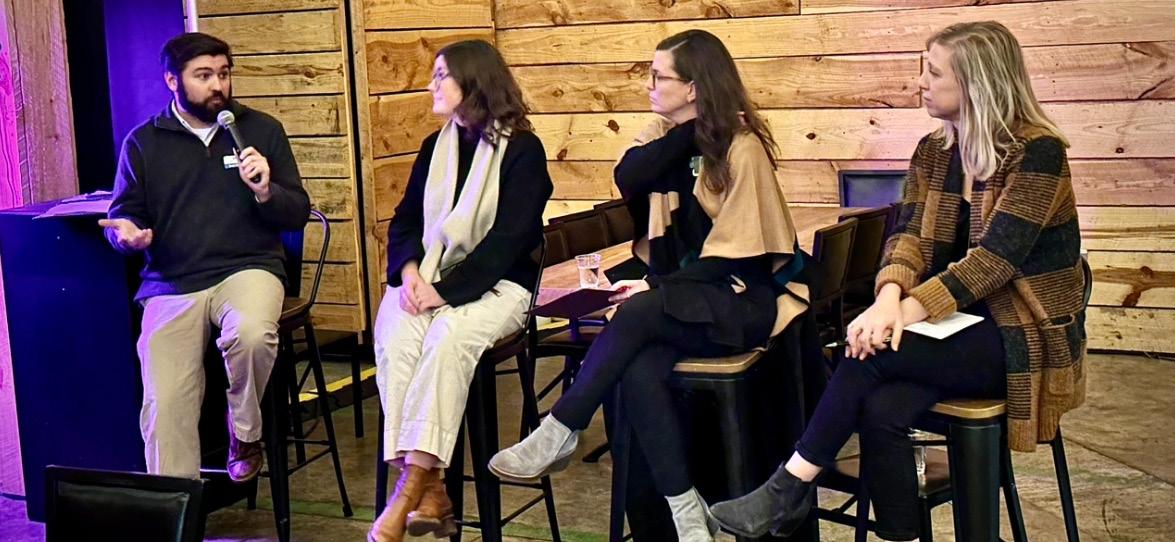
sponsorships, corporate sponsorships, or grants can provide revenue. Different BIDs have different models for determining tax rates for these services, and rates can vary depending on the level of services stakeholders desire.
While not funded or organized directly by a municipality, BIDs do have some sort of relationship with city leaders. Some include representatives or partnerships, and often city leaders or city council members play a role in supporting BID creation. Some BID activities and initiatives are performed in partnership with the municipality, and BIDs can help municipalities determine their priorities as well.
BID boundaries can be determined in the creation process. Typically, a boundary encompasses a central business district, but the lines can be negotiated depending on where the majority of economic activity occurs as well as where the community feels it needs a higher level of service. With an average rate of 75% for renewal votes, business owners seem to enjoy BID services. As a conduit for business owners to the city, most BIDs see high levels of engagement from owners and a high level of response from their leadership, and the BID is often seen as a value-add for businesses. Those surveyed have shared positive feedback, and those involved say a BID offers benefits for business success.
Viewing other businesses as potential collaborators rather than competition is a healthy way to help your business and the entire community thrive, according to Southern Porch Co-owner Michaela Lowe.
As a small business owner, Lowe is primarily a member of the Canton community. Along with other area small business owners, she helped create continued on page 30



Serving the area since 1936, Southern Alarm & Security offers state-of-the-art electronic security system technology to homes and businesses. Relying on eight decades of experience, Southern Alarm leads the security industry as Western North Carolina’s largest and only locally owned UL-certified alarm company. Southern Alarm is the area’s exclusive authorized dealer for the Honeywell line of security systems and services. A complete array of electronic security services, including 24-hour monitoring, burglar and fire alarms, surveillance TV, access control systems as well as home automation and lighting control is available.
Hendersonville: 828-693-7136
Asheville: 828-253-1235
Franklin: 828-524-2268
SouthernAlarm.com

The Vault by Marthaler is all things Americana and a great appreciation for our military and firstresponders. Imagine a little bit of Yellowstone and 13 Hours combined with great knife brands, fly-fishing gear, outdoor wear, firearms and accessories with a literal vault included, in a space that is easy to be in and you have The Vault. Having jewelry attached means they can offer all the things guys and ladies love under one roof. (Hint, Hint) They have been intentional about bringing in as many local brands as possible in addition to the brands that they have always known and loved. Stop in-they would love to show you around.
3578 Hendersonville Road | Fletcher 828-676-1625
VaultByM.com

Warren Restoration is a local, family owned business offering disaster restoration services such as cleanup and repair from water, fire, mold, or storm damage. Their certified team also provides encapsulation services to remedy crawl space moisture issues, biohazard and hoarding cleanup services, and more. With emergency response teams available 24/7, your emergency is their priority. Call the team at Warren Restoration and know that ‘it’s going to be okay.’ Recipient of the 2022 Henderson County Chamber of Commerce Small Business Leader of the Year.
9 Legend Drive | Arden 828-595-4776
Help@WarrenRestoration.com
WarrenRestoration.com
“There are many ways you can work with other businesses in ways that are mutually beneficial, and there’s no better way to be their cheerleader than to invest in what they believe in and what makes them happy.”
a group called the Canton Merchant Partners. This casual group of business owners work together to attract people to the area, helping all area businesses to grow. Coordination has helped businesses level up, chipping in on things from marketing and advertising opportunities to sharing dumpster services.
“It’s important to support each other,” Lowe said. “Whether they need a cup of sugar or we support another local restaurant by going to eat or we talk to exchange business ideas, we know we can grow business by working together.”
The group is growing, and Lowe said the growth consists of both long-time residents and people who are new to town. Growing up in Canton, Lowe knows a lot of people, and she said these long-standing connections are helpful in the business community. She can pick up the phone and reach out to someone associated with the needs at hand, and the closeknit group welcomes newcomers who are interested in meeting other small business owners so they can also have that ease of connection.
“There is never any pressure, and the invite is extended for everyone so we can all work together,” Lowe said.
Lowe anticipated coordinating events and projects with other business owners, but more than business contacts, she found area small business owners creating true partnerships and building their community. Whether other small business
owners are members of the group or not, Lowe finds small business owners in the Canton area are active participants in supporting each other, which helps the entire town thrive.
In small towns, small business owners and leaders don’t just work there. They also live nearby, are often friends with other business owners, and are regular customers of each other’s businesses.
Supporting other small businesses in town supports the hometown as a whole, and it is often easy to be their cheerleaders. From florists to dry cleaners to housekeepers, being a customer of a local business is being a partner of their business.
“You don’t have to be a member of a group and attend meetings to be a part of something,” Lowe said. “There are many ways you can work with other businesses in ways that are mutually beneficial, and there’s no better way to be their cheerleader than to invest in what they believe in and what makes them happy.” Small business owners are usually interested in getting in front of potential clients or customers, and many local businesses are interested in doing that by way of supporting community groups and events. Activities like sponsoring the local football team, volunteering, and finding other ways to help in the community not only spread the word about their businesses, but also help bring the community together as a whole.
In Canton, the Canton Merchant
Partners worked with the NC Community Foundation and received a Crusoe Endowment allowing an ice skating rink to be installed downtown. Lowe said this brought awareness to the town as a whole, brought visitors to the town during traditionally slow months, and gave locals a fun activity in which to participate.
“It was a reminder that Canton is still here and our businesses are still open,” Lowe said. “The businesses chipped in to make this happen, making the holiday time feel extra warm and giving that ‘Hallmark feeling’ Canton is known for.”
Positive relationships among business owners help support the community during difficult times. The town of Canton has experienced several challenges over recent years including COVID, flooding, and the closing of the Pactiv Evergreen mill. Lowe said she saw that community members were happy to show up for area businesses, rally around them, and support them because they want to see the local businesses remain after the challenging times pass. Shifting business models, sharing ideas, and becoming literal “boots on the ground” after a disaster demonstrates how the community spirit among business owners uplifts the town as a whole.
“The average person may not see all the things going on behind the scenes, but the community feels it,” Lowe said. “We hope visitors can feel it too, and hope they keep wanting to come back for more.”
The Asheville location offers weekly meetings that allow entrepreneurs to present their business ideas to their community, receive feedback, and interact with their community.
1MillionCups.com/s Account/ 0014W00002AqQd8QAF/Asheville-NC
A Black business incubator with a mission to help people turn their ideas into reality and to build a supportive community for BIPOC business owners.
BlackWallStreetAVL.com
Grows and supports an engine of local economic growth through programs which offer an accessible pathway for small business success.
CarolinaSmallBusiness.org
Provides assistance in property development, economic development, and access to human services to the lowto-moderate income community.
EagleMarketSts.org
Focused on recruiting new businesses to the state, supporting the needs of existing businesses, connecting exporters to global customers, and helping small business owners get their start.
EDPNC.com
Connects and highlights existing area small businesses registered in Buncombe and surrounding counties.
GoLocalAsheville.com
WNCBusiness.com
A regional partner of Women’s Business Enterprise National Council providing Women Business Enterprise certifications.
GWBC.org
Offers access to mentorship, funding, and physical space that help businesses build, learn, and scale.
HatchInnovationHub.org
Works to provide policy, planning, oversight, and funding for local workforce development programs and to address workforce issues as they emerge.
MountainAreaWorks.org
A community development financial institution offering business loans in Western North Carolina that may find it difficult to secure funding from traditional sources.
MountainBizWorks.org
Fosters sustainable economic development with competitive grants and programs for entrepreneurs and funding to strengthen the entrepreneurial ecosystem.
NCIDEA.org
Memberships include access to workshops, mentors, local employers seeking talent, and a young professionals community of young professionals.
AshevilleChamber.org/Get-Engaged/ Special-Programs/PROpel-AVL
Offers one-on-one and team counseling sessions as well as face-to-face and online resources to people ready to start or expand a business.
WesternNC.SCORE.org
An advisory resource for growing and developing businesses offering training videos, start-up guides, funding opportunity guides, and other resources such as business planning, marketing, legal, and human resources.
SBTDC.org.
A free online platform that helps business owners find the support, advice, and access to capital that they may need across the state.
Supportedly.com
Connects small business owners to partner organizations, lenders, and other community groups, as well as offers resources for every phase of business development.
SBA.gov
Helping to grow the startup community and connecting entrepreneurs to talent, mentors, and investors through unique programming and events.
VentureAsheville.com
A program of Carolina Small Business Development Fund with a mission to foster economic development in the state.
WWBCNC.org
Despite anecdotal conversations of a decrease in tourist activity across the region, the tourism industry shows growth in a variety of aspects.

According to Riverbird Research, the number of jobs in the region’s hospitality and tourism industry (Harvard Cluster Definition) increased over the five-year span between 2018 and 2023.
The 8% increase in the total number of industry jobs in an 18-county region of WNC outpaced the rate of growth for the entire state, which was 2%. The total number of WNC jobs supported by hospitality and tourism numbered 13,930 across 906 payrolled business locations, earning an average annual wage of $34,985. The overall concentration of industry jobs in WNC was twice the national average.
The highest concentration of these jobs occurred in Buncombe County which supported 6,621 of these jobs in 2023, distantly followed by Watauga County which supported 1,356 of these jobs.
Operating as a unit of the Economic Development Partnership of North Carolina, Visit NC is a tourism marketing organization that promotes destinations and attractions across the state.
Visit NC’s 2022 North Carolina Regional Visitor Profile, which is based on data sourced from the OmniTrakGroup Inc. research company’s TravelTrakAmerica program, highlights visitation to different regions of the state and the impact visitors have on each region’s economy. The findings are published in June.
In 2022, the state ranked number six in the country for domestic visitation with 43 million person-trips. Approximately 11.5 million travelers visited the mountain
region, with 75% of those being overnight trips. Summer and Fall were the most popular times of year for travelers, with 85% of visitors traveling for recreational purposes and 6% traveling for business. The average visitor party size was 2.5, spending an average of $822 during their visit.
Mountain visitors typically stayed in the area for three nights, and 54% of those stayed in a hotel or motel rather than other types of accommodations. The majority of mountain visitors, 88%, drove to the area from states including SC, GA, FL, TN, and VA.
The mountain region had the highest percentage of visitors participating in hiking/backpacking activities — 32% — compared to the coastal and Piedmont regions with only 7% and 6% (respectively) of visitors participating in those activities.
Tourism Economics prepared traveler spending estimates for NC and each of its counties for 2022. The Western and Northwest regions, which together include 25 counties, represented 22.1% of the state’s visitor spending, a regional total of $7,369,500,000. This revenue resulted in an average savings of $399.55 in state and local taxes per resident.
Visit NC primarily works with destination marketing organizations such as Explore Asheville as well as county partners. Website topics are focused on what data shows public interest is with a goal of anticipating what information will be of greatest use to potential visitors. As the organization is contracted with the Department of Commerce, Visit NC often works in areas in which tourism marketing will have the most meaning.
Visit NC’s marketing content spans a variety of platforms including their website, newsletters, print marketing, television campaigns, YouTube, and social media. Target recipients are not demographic-based; rather, they are based on motivation for travel with a focus on people looking for discovery and enrichment.
Geographic locations are a determining factor in targeted marketing as well. Being in a lucrative position on the East Coast that is easily accessed by multiple interstates, marketing different aspects to different regions can help maximize visitation.
Tourism itself is a major economic driver of the region, but tourism also plays a role in overall economic development in all sectors. Several businesses have been created in or expanded to Western North Carolina starting with a visit to the area, leading to a variety of impactful projects which further drives the area’s economy.
Visit NC’s Executive Director Scott Peacock said as tourism continues to increase in popularity, the importance of destination management and stewardship
also increases. The organization works to collect data to determine things like overcrowding, over-popularity of hiking trails, what percentage of their users are visitors versus locals, and how to appropriately manage messaging around that.
“Our goal is to provide awareness around these issues, and help local tourism offices facing these challenges maintain the assets that make these places so special,” Peacock said. “It must be balanced with the tax creation and job development tourism brings.”
Working with local guides and outfitters, content including fliers and ‘Know Before You Go’ emails helps educate visitors on area concerns and how to interact with the area responsibly.
Tourism messaging is also intentional about dispersion, both in sharing prosperity with outlying areas as well as seasonality.
“We share a lot of messaging focused on tourists staying in outlying areas like Waynesville or Maggie Valley, exploring there, and maybe coming into Asheville for the day,” Peacock said. “We are filming more ads in winter, and have increased funding to be more targeted in all four seasons. We want to do our part to help keep tourism responsible and sustainable.”
Businesses interested in marketing through Visit NC are encouraged to reach out to their local destination partners or a point of contact with their county’s chamber of commerce or tourism department. Contact information for these are listed on VisitNC.com. Interested businesses can also send emails via their Contact Us page on the website.
Comprising 20% of Buncombe County’s economic impact in 2019, the Biltmore continued on next page
12,910 Jobs in 2018
13,930 Jobs in 2023 8% Job Growth
1,020 2018-2023 Change in Jobs $34,985
2023 Average Annual Wage Excluding supplements
906
Payrolled Business Locations in 2023
The concentration of jobs in the 18-county region was 2.0 times the national average.
2018-2023 employment growth of 8% was greater than the state’s overall 2%.
Estate has been a catalyst for the tourism and hospitality industry since John and Cornelia Vanderbilt Cecil opened their house to the public in the 1930s.
Biltmore has been a major employer in WNC since its inception. Currently 2,200 employees serve the estate’s 1.3 million annual guests and maintain the estate itself. Economic data from a study produced for Biltmore in 2020 by Oxford Economics estimated Biltmore’s total economic impact in Buncombe County to be $620 million in FY19.
Also during FY19, $17.9 million in direct spending was generated by Biltmore’s preservation efforts, which touch all aspects of the business including the gardens, farmlands, the 250-room historic house, and other original structures that are a part of Biltmore’s National Historic Landmark designation.
Out of the 1.3 million annual guests, approximately 128,000 stayed overnight at one of the estate’s hotels. Apart from Annual Passholders, 95% of ticketed visitors come from outside the WNC area. Guests visit from other NC cities like Charlotte and the Raleigh-Durham area, and other nearby Southeastern cities like Atlanta, GA; Knoxville, TN; and Washington, D.C. Guests have traveled to visit Biltmore from the Yukon region of Alaska, Hawaii, and internationally as far away as China and India.
According to Biltmore’s Public Relations Manager Marissa Jamison, WNC locals are just as important to Biltmore. Annual Passholders are largely residents of Buncombe County and regularly take advantage of year-round access to the estate. Thousands of locals have been employees over the years, committing

their strengths and talents to the estate’s mission of preservation.
“We consider local residents to be a vital part of who Biltmore is as a familyowned business,” Jamison said. “Ensuring that locals visit and that we share a common value of preserving Biltmore for generations to come is essential to our business and growth.”
To encourage the Estate’s visitors to return again and again, Biltmore offers seasonal events, regularly updated audio-narrative guides, regular room restoration projects, and various exhibitions. Biltmore’s Outdoor Adventure Center offers a variety of regular and seasonal outdoor informational sessions and activities, and the expansive gardens are updated and changed seasonally to offer guests a different perspective each season.
“When considering new experiences and events, the opinions of our guests matter and we are always seeking feedback,” Jamison said. “We use surveys and reviews to understand our guest preferences, suggestions for new offerings, and areas for improvement.”
Biltmore’s winery is a significant attraction outside of the house itself. Guests can enjoy complimentary tastings in the estate’s former dairy barn, purchase bottles to take home from the retail area, and join the Vanderbilt Wine Club to receive discounts, invitations to events, and first access to new wine releases. More than 150,000 cases of wine are sold annually, and other products are created on the estate or with area partners. The estate’s bee hives produce honey used in estate restaurants and sold at the estate’s retail outlets, and the eight-mile long pathway of sunflowers planted annually is used to create a sunflower oil also used and sold on the property.
Local partnerships include Waynesville Soda Jerks, who collaborated on a Blueberry-Basil Soda which has been made with hydroponically-raised basil
from Biltmore’s field-to-table program. Biltmore also collaborated with Chemist Spirits on several products, most recently the Biltmore Single Malt Whiskey release. Participating in the local community goes beyond Passholders and business partnerships.
“George and Edith Vanderbilt were the starting point for Biltmore’s support of the WNC community,” Jamison said. “Their work extended beyond the boundaries of Biltmore, with initiatives that improved the lives and economic outlook for people throughout WNC, including adult literacy programs and Biltmore Industries; support for the arts, the hospital system, 4-H Club, and the North Carolina State Fair.”
The most recent fiscal year marked the highest amount of annual giving in the company’s history, according to Jamison. Key partners include Homeward Bound, Habitat for Humanity, MANNA FoodBank, and more than a dozen others, as well as Buncombe Partnership for Children to build capacity for more childcare slots in the county for children three years old and younger. “Biltmore continues the Vanderbilts’ community-based work today by investing in community needs that are being met through nonprofits,” Jamison said. “We select focus areas for philanthropy that are reviewed every three years. Current focus areas include people in need, preservation of cultural experiences, conservation of the natural environment, and sustaining the economic vitality of WNC.”
Understanding Madison County’s wintertime tourist draw for skiing and other winter sports, The Hatley family saw an opportunity to revitalize the former Wolf Laurel Ski Resort and is currently performing major renovations on the property now called Hatley Pointe.
The ski area near Mars Hill has been incredibly popular with locals for many years, according to Hatley Pointe’s Creative and Marketing Director Matt Rossetti. While Beech and Sugar Mountain are larger ski resort areas far from interstate travel routes, they are very popular, even often overcrowded, and harder to get to.
Located just off I-26 near the Tennessee state line, the Madison County ski area is easily accessible for people from Asheville and Johnson City, TN. Compared to resort areas in the High Country, this location is also more convenient for visitors from Charlotte, Atlanta, GA, and Charleston, SC.
providing a place to anchor a trip, especially in the otherwise slower tourist season during the winter.
“They are traveling to have some sort of experience,” Rossetti said. “Having a mountain with a lot of recreation activities offers something for people to center their visit around, providing travelers more value for their trip.”
With a goal of increasing tourist capacity in the area, the new owners plan to expand activities to the mountain while maintaining a friendly feel rather than a corporate vibe found at some other ski resort areas. Snow infrastructure repairs were underway in early 2024 to reach a higher safety standard and better snow quality, and plans are underway to offer snow tubing and ice skating in addition to skiing and snowboarding.
Younger generations of travelers tend to seek vacations based on things to do rather than just places to go, according to Rossetti. Having a place with activities is important in attracting tourists and continued on next page

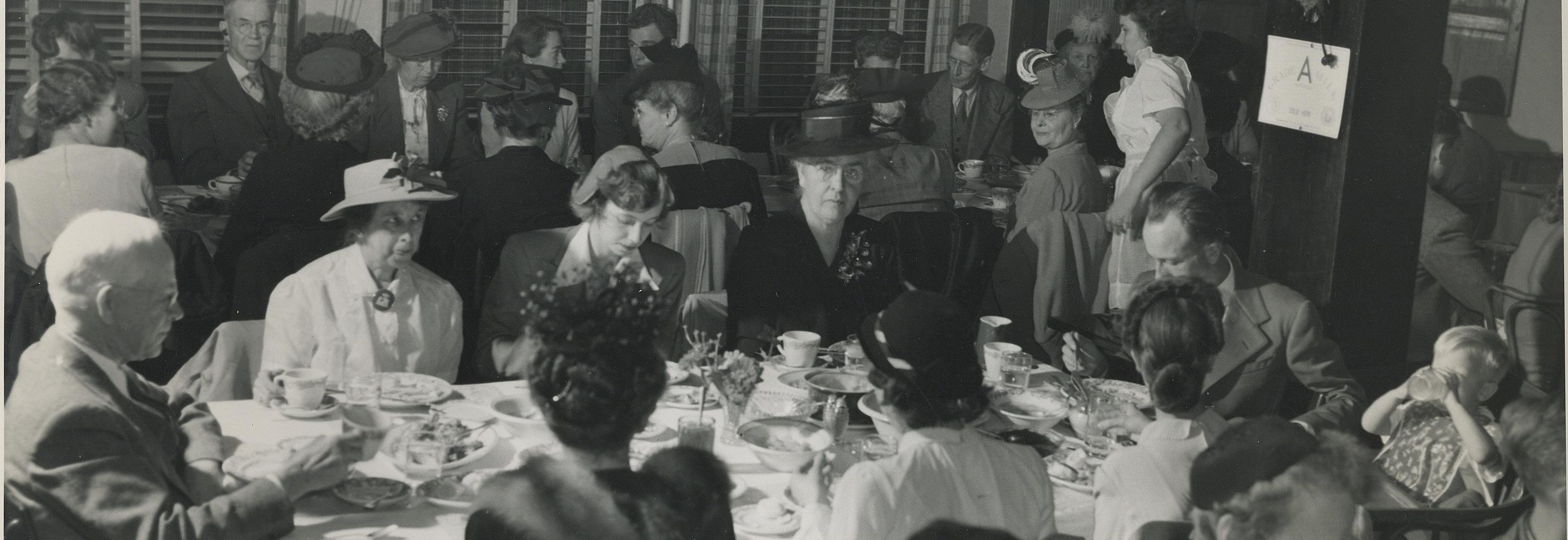
In 2024 and 2025, the resort will open a lodge with a café bar and restaurant. The slopes will become multi-purpose, incorporating things like scenic chair lift rides and mountain biking trails as well as other family friendly activities for any season. Longer-term plans include the potential to add more lodging, long-and short-term rentals, as well as homes for sale.
“The company is looking to expand beyond a simple ski resort and build an entire ski town,” Rossetti said. “It’s very aspirational, but it can exist here and the community is open to the idea. They have been looking for that kind of investment and care here.”
The surrounding Madison County communities see the value of increasing tourism to the area, according to Rossetti. Those who own nearby small businesses have the potential to see more visitor traffic, and vacation rental owners will see an increase in their revenue.
“Since the recession in the mid-2000s, the area has kind of been neglected by investors,” Rossetti said. “By revitalizing and adding to a greater resort area, it provides a chance for that investment to return to the whole community. It opens the door for a lot of opportunities.”
Visitation to the Wolf Laurel/Madison County area has been down over the
last decade, and Rossetti said they are interested to see what their seasonal capacity will be. Maintaining a symbiotic relationship with nearby cities like Asheville is important, as the tourism draw of each area plays off each other. If there is bad weather on the mountain, visitors can venture into the city for the day. Others visiting the city can easily take part of a day to enjoy the activities offered in the ski resort area.
“People are seeing ‘their mountain’ being given the love and attention they feel it deserves, and they are thrilled,” Rossetti said. “We have heard from people who used to vacation here and are ready to return to the area as well as our neighbors from nearby towns. There is lots of nostalgia surrounding a wintertime ski trip to the mountains, and we are ready to renew that feeling for visitors.”
Having an eye for history and being drawn to old things, James Keith and his wife Amanda are currently renovating the NuWray Hotel in Burnsville — the longest continuously operating hotel in North Carolina. Built in 1833, the hotel exemplifies WNC as a long-standing tourist destination.
The NuWray Hotel was built early in Burnsville’s history, before Yancey County was formed. When the hotel was built nearly 200 years ago, many people arrived by stagecoach. Travelers had to make frequent stops, and many towns were formed around popular stopping points. Burnsville, home to logging and manufacturing industries with a relatively close proximity to Asheville as well as its own mountain scenery and activities, was one of those towns.
Hospitality was critical to the area’s early travelers, and in addition to providing lodging, the early NuWray owners owned a farm and canned vegetables, which provided for a ‘southern smorgasbord’ style restaurant within the hotel. Visitors were served family-style meals including items like smoked ham and fried chicken while music was played on a reginaphone. In the early 1900s, the popularity of the hotel and its restaurant landed it in national publications.
“It attracted visitors, many of them famous, because of its traditions,” Amanda Keith said. “At its height, the hotel had 40 rooms. It was always a bustling place.”
Similarly to the Keiths, who are now on their third historical renovation, many visitors are attracted to destinations rich with history. Travelers visit places
like Burnsville just for the ambiance of staying in a historic hotel, as places like the NuWray offer a sense of nostalgia and a deep connection to history.
Since COVID, the popularity of visits to small towns has increased. The Keiths agree that an increasing number of visitors to WNC may choose an outlying town that offers the experience of a mountain vacation without the crowds of Asheville, and with that, they also create charming, memorable experiences.
“The unique story is really the town,” Amanda Keith said. “We have a charming town square, a friendly feel, and a close community connection. It’s harkening back to old times, and it’s reassuring that those things still happen in today’s world. It’s not a television show; it’s just the culture here.”
While tourists visit WNC from all over
the US, many from the deep south, the Keiths said they see a lot of people visiting small mountain towns like Burnsville from nearby metro areas like Asheville and Johnson City.
“It’s a different aesthetic for these visitors,” James Keith said. “They like these quaint places, and historic places in small towns allow them to feel like they’ve really left the city behind.”
The aesthetics are an important part of the draw for many visitors, but the historical preservation is an important aspect for the entire community. Once the use of an old building has changed or a building has become defunct, it tends to go away, and the Keiths wanted to make sure that didn’t happen to the NuWray. Their goal is to have it in great condition for another century of
“We’re not just looking at the return on our investment,” James Keith said. It would have been easier and cheaper to tear it down and rebuild it, but that would have been a huge loss for the community. This preservation is for visitors and the tourist tradition, but more so for the locals. We want to be here for them because the tourists are going to come regardless,





finish the décor with antique furnishings.
“Guests entering the hotel will feel just like guests did when they entered in the 1920s, but with a balance of modern comforts and the historic feel,” Amanda Keith said. “We want people to keep coming here for the hotel, but in reality, the things that draw people to this area are the same things that have drawn them here for hundreds of years. They come for the outdoors, the refreshment, and the southern hospitality. It’s the overall beauty of these mountains; it’s a place where people can really get away.”
One of the oldest tribal museums in the country, the Museum of the Cherokee People opened in 1948 in a location primed and ready for tourism — along the
road to the entrance of the Great Smoky Mountains National Park.
During the 1940’s, the town of Cherokee and the Qualla Boundary were among some of the poorest areas in the US, according to the Museum’s Executive Director Shana Bushyhead Condill. As the logging and textile manufacturing industries began moving out of WNC, the Cherokee tribe made an intentional lean into focusing on the tourism industry. “Our people had to think about how they were going to feed their families,” Condill said. “We are grateful to the advocates of the National Park entrance here. The road goes right in front of our doors, and about three million people per year use that entrance.”
More than 84,000 people visit the Museum per year, and Condill said the area’s visitors stay an average of three nights. Many rent
an AirBnb or stay in an area hotel while enjoying the area’s amenities, and with so much Native American history and culture in the area, Condill said it is a key location for many tourists.
The Museum of the Cherokee People is one of several cultural partners who all work together for the benefit of the community. With the Cherokee Historical Association which hosts Unto These Hills, Oconaluftee Indian Village, and Qualla Arts and Crafts Mutual, Inc., the organizations speak with tribal council members who then actively participate in the region’s marketing efforts.
The Museum and other Cherokee organizations offer a variety of programs for tourists interested in Native culture. Cultural specialists engage visitors and provide information in addition to providing educational programs and receiving invitations to speak on a variety of topics.

The tribe also focuses on the area’s outdoor recreation attractions. Situated in a location with natural amenities that visitors enjoy, the tribe supports visitors’ natural experiences by offering things like tips for fishing and the Fire Mountain Trails — a multi use trail system that’s made to mountain bike, hike, or run. Combining the area’s sense of nostalgia with education and outdoor adventure continues to entice visitors to the area, and Condill said it is an exciting opportunity.
A fresh renovation of the Museum of the Cherokee People will include a new exhibit called “Sovereignty.” The exhibit will share some of the history of the tourism industry and the hard work of the Cherokee tribe. Condill said tribe members are excited to be able to think about this exhibit from the ground up and consider what stories they choose to tell. This allows the tribe to think about its future and how they would like to present themselves to visitors in years to come.
“We’re not an art museum, and we are not a natural history museum,” Condill
said. “We are a museum of a living people. We all work hard to make sure that the interactions we have are not performative. We’re not just dancing for you; it’s an intentional interactive educational experience, and we want visitors to have that authentic experience.”
The shift toward increasing authenticity has been a journey for the Cherokee people, according to Condill. People may remember the Cherokee of two generations ago when they had to incorporate Hollywood stereotypes to attract tourists, but people are beginning to see a transition away from this.
“We did what we had to do to put food on the table,” Condill said. “We are very privileged now to be able to shift away from that. We don’t have to wear headdresses and throw tomahawks, and our young people are excited to see that.”
While the WNC community has a tendency to support local, the arts and creative economy is highly dependent on support from tourism. According to ArtsAVL Executive Director Katie Cornell, a variety of creative aspects draw tourists to the region.
Collective art districts such as Asheville’s River Arts District become a destination for tourists. These districts allow visitors to see a variety of working artists in their open studios in one small, walkable area. RAD specifically grew a reputation for featuring contemporary regional crafts, and arts enthusiasts are regularly drawn here for that.
A plethora of WNC’s art-focused events and festivals create popular visitation times for tourists. Festivals feature varieties of art including paintings, pottery, handmade clothes, candles, and woodworkings, along with craft food and beverage vendors often set against a backdrop of live music. These events not only attract tourists, they increase
visibility and act as an incubator for the makers and small businesses in the area.
The arts and creative sector was one of the most impacted by the pandemic, according to Cornell, but the number of people employed in that sector has now surpassed the number prior to COVID. Instead of losing jobs because of businesses closing, the number of businesses remained similar through recent years but employment shrank as they were not able to support the same number of staff. Many of these businesses continue to seek grant funding to continue operations; however, sponsorships by local businesses are down because of the uncertain season in the country’s economy.
“The arts are very much affected by fluctuations in tourism and tourists’ behaviors,” Cornell said. “Artists’ retail sales will decline when the amount of
tourism declines. This is not unique to Asheville or Western North Carolina, but other places are not quite as reliant on tourism. Our creative reputation and locals supporting locals helps some, but we still have tourism dependence.”
A 2023 study completed by ArtsAVL provided data demonstrating the economic impact of local nonprofit arts and culture organizations in Buncombe County. In this county alone, it was determined this sector was responsible for $51 million in economic activity which supported more than 1,200 jobs and nearly $13 million in tax revenue in 2022.
Historic sites are considered a portion of the creative economy, and represented $260 million in sales in 2022, according to ArtsAVL’s 2023 study. Historic sites are cultural resources, and many people visit
continued on next page

the area for the “whole package of arts and history,” according to Cornell.
“Since the beginning of tourism to the Asheville area, there has been a large influence of the arts,” Cornell said. “As people traveled here for the healing properties of the area, the Mecca of an arts town became just as renowned. When the Vanderbilts came, they brought a lot of artists and creatives with them. Music, pottery, and weaving have always been here, but with people and influence like Thomas Wolfe, it started its own revolution.”
With the arts drawing tourists to the area, there are industry concerns regarding the artists themselves and their ability to continue to afford to live here. ArtsAVL offered Buncombe, Haywood, Henderson, and Madison Counties a Creative Spaces Survey from February to March 2024 in order to identify sustainable solutions to issues regarding local creative and living spaces impacting artists’ growth and development.
The survey will compile information including a cost of living assessment, determine median earnings for creatives, highlight potential solutions, and explore potential partnership opportunities.
Survey participants will also share the impacts of these challenges on their ability to produce art in WNC. Results are expected to be shared in May 2024.
“We need to understand what initiatives need to be put in place to keep creatives in the Asheville MSA,” Cornell said. “We are working with candidates to ensure they understand arts-related issues and, conversely, ensure artists understand where candidates stand. The arts industry is so heavily impacted by the cost of living, and we’ve got to find a way to keep our artists here.
Beginning in 1957 as a train ride in WNC’s High Country, Tweetsie Railroad has become an attraction bringing more than 250,000 visitors to the region each year, according to President and Owner Chris Robbins.
According to Robbins, the amusement park has changed in a lot of ways, but maintains a classic nostalgia that maintains visitor interest. The original train track was expanded to a three-mile loop, a wild-west theme was adopted, and

souvenir stands, food options, and rides have expanded over time and continue to be replaced and updated to give visitors a reason to come back year after year.
Adjusting to market conditions is one way the attraction ensures guests get the best experience during their visit. Changes in the number of days the park opens is one notable change; Robbins said there were some days that it didn’t make sense to open because so few people would come. By backing off the number of days in the regular season, and adding special seasonal events, the visitor count per day is up and each part of the park is available for guests’ enjoyment.
Other special activities including the Frisbee Dogs, the Day Out With Thomas, and Railroad Heritage Weekend attract guests interested in these additional offerings.
“The rides and the event themes change every once in a while, but the family atmosphere stays the same,” Robbins said. “It’s a balance of keeping things fresh and maintaining continuity of who we are. We don’t want to mess with the essential ‘Tweetsie-ness’ of the park. The train is the feature and we wouldn’t exist without the train. Everything revolves around that.”
Adjusting marketing and advertising strategies has also boosted visitation numbers. As the state’s population continues to grow, the new NC market adds new opportunities for marketing. An emphasis on social media allows captured guest content to be shared with audience members, which Tweetsie’s Marketing Director Meghan Minton said makes it easy to portray the real story of a visitor’s experience.
“Social is social, and people like to talk about their visits,” Minton said. “It’s a great place to bring family and friends, and people like to shout it from the rooftop. We still do traditional marketing to let people know about events, but posting social media content is about sharing families’
stories and offers new visitors a sense of personal connection.”
Guests visit Tweetsie Railroad from easily drivable distances of North Carolina, as well as from other states like Florida, Virginia, and South Carolina. Those traveling from farther away stay for several days to go shopping, eat at restaurants, and stay in area hotels or AirBnbs.
“This adds up to a huge amount of tax revenue for the county and its towns,” Robbins said. “A report from 2006 showed it was tens of millions of dollars. We haven’t completed a similar report since, but we’ve extended our season since then so we estimate the tax revenue is even more now; it must be a staggering figure.”
The Asheville Independent Restaurant Association is a 501(c)(6) organization committed to supporting the independent restaurant community in Asheville through education and training, advocacy, and member collaboration.
AIRAsheville.org
NCRLA serves members by advancing and protecting North Carolina’s hospitality industry by impacting legislation and policies, cultivating relationships, and providing valuable resources to help members run their businesses.
NCRLA.org
The impact of employment is large as well. Tweetsie maintains 37 full-time, year-round staff, but during the summer, that number jumps to about 250 people, with at least 150 working on any given day.
Extending beyond direct hires, the amusement park supports a variety of local businesses through additional service needs. There are many suppliers, foodservice workers, contractors for infrastructure improvements, track and trestle maintenance, electricians, carpenters, plumbers, and other local services that Tweetsie has built relationships with over the years.
Maintaining personal relationships is an important value for Tweetsie’s company
The NCTIA’s mission is to consolidate resources and promote North Carolina tourism for their membership which consists of local businesses and statewide organizations that thrive on the tourism economy.
NCTIA.Travel
Tourism Education Foundation of North Carolina
TEFNC is a non-profit corporation working with industry partners to build a reimagined hotel industry with employee recruitment and workforce training resources.
TEFNC.com
The River Arts District Artists is a membership organization established to promote the common interests and wellbeing of its 300+ artist members.
RiverArtsDistrict.com/Join-TheArtists-Association
culture, with local businesses as well as guests. Rather than investing in focus groups or market studies, leadership at Tweetsie Railroad prefers a grassroots method of receiving community feedback.
“To find out what our customers think, we go right outside and ask,” Robbins said. “Guests love the family-friendly, nostalgic atmosphere, and the locals love Tweetsie as well. The train is over 100 years old, and we are preserving a part of the history of the railroad that once serviced Boone back in the 1800s. They love hearing the whistle, and having a relationship with the local population is great. We’re fortunate to support the community in multiple ways.”
Visit NC
Visit NC is a tourism marketing organization that promotes destinations and attractions across the state.
VisitNC.com
We Speak WNC helps connect visitors and locals to locally-owned small businesses across the region, and promotes entrepreneurship by connecting entrepreneurs and growing businesses to available resources for organizations at any stage of growth.
WeSpeakWNC.com
—
Find a comprehensive list of resources for businesses and organizations of all types at WNCBusiness.com/Resources.
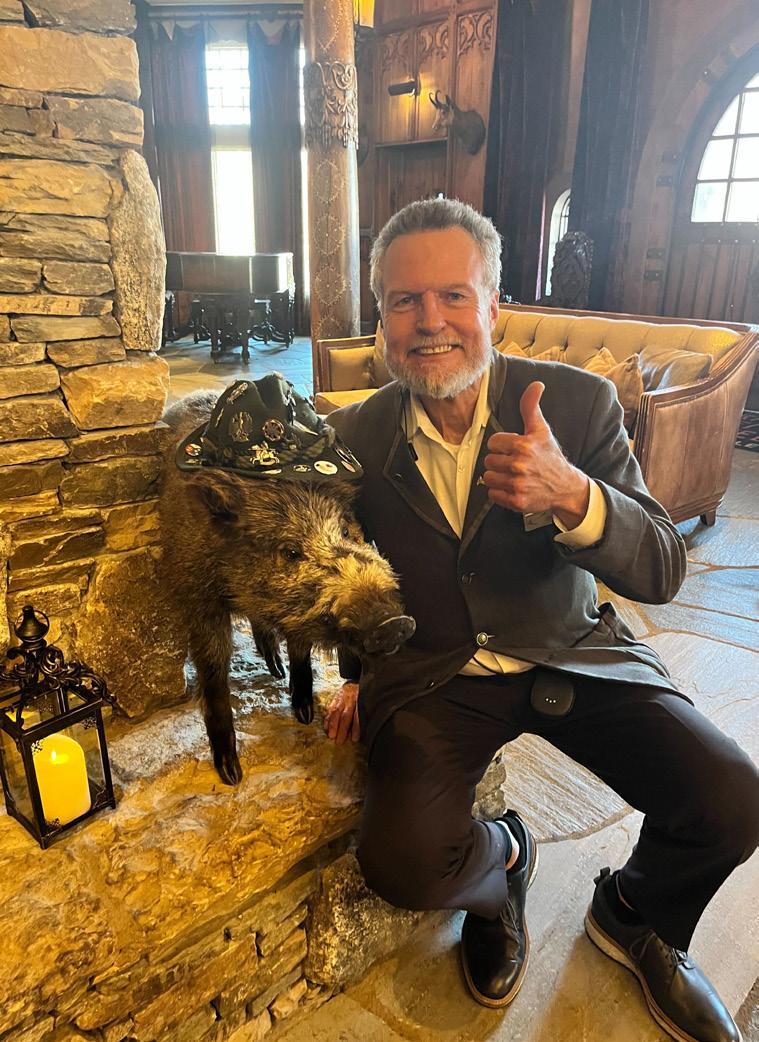
After the Grove Park Inn was sold to a resort company in 2009, Allan Larson chose to continue his hospitality career as a concierge at the Grand Bohemian Hotel in Biltmore Village.
The main focus of Larson’s job is to take care of the hotel’s guests and ensure they have a great experience during their stay. He does this through a variety of tasks including the coordination of housekeeping and amenities, preparing guests’ check in and check out documents, and answering guest questions about the area.
“Guests ask me anything from dining and shopping recommendations to scheduling spa services to driving directions,” Larson said. “I talk to anywhere from 10 to 50 guests in a day, and I try to get helpful information to them.”
The hotel is usually busy at any time of
year, according to Larson. October is their busiest month, closely followed by the spring season when people come to visit the Biltmore Blooms, as well as during the summer when parents spend time in Asheville before and after dropping their children off at local summer camps.
Larson said many guests visit from Florida, and other Southeastern cities like Atlanta, Charleston, and Charlotte. He sees many guests visiting from Chicago, New York, and other areas of the Northeast as well. Many of them enjoy similar activities including visiting the Biltmore Estate, the science and art museums, the Arboretum, and the Asheville Adventure Center.
“People come visit here from all over, and many of them are coming for the same thing,” Larson said. “People love the backdrop of these mountains. Throw in the restaurants, breweries, the art, and the weather, and you have a place people love to come back to year after year.”
Engaging guests is Larson’s favorite part of the job. He enjoys sharing what he loves about the area and recommending places to eat, drink, and visit. His recommendations are always based on his personal experiences; there are no commissions or contracts with area establishments to point guests in a certain direction, so the conversations are always authentic. Over recent years, he has noticed that many people do their area research online and are asking fewer questions because of availability of information, but they still enjoy the knowledge of a local.
“We really have a lot of fun here,” Larson said. “Each guest is different and each day is different, and the staff I get to work with is really great.”
A challenging part of Larson’s job can be coordinating amenities. As the Grand Bohemian Hotel is affiliated with Marriott, Marriott Ambassador Elite members get specific amenities when they stay. These need to be arranged before guest arrival, and sometimes there can be 30 of their 104 rooms that must be set up for these guests in a day. Balancing room inventory can also be challenging. With 30 types of rooms, part of Larson’s job is to make sure each guest gets the room type they expect upon arrival.
Many of Larson’s guests return to the hotel annually. He said the summer camp parents usually visit around the same time every year, and he also sees repeat business travelers during the week. It is possible for Larson to look at guest profiles before they arrive to see notes of what they like, making it easier to know how to serve them upon their return. After many years as a concierge, Larson continues to enjoy his job in the tourism and hospitality industry. He does have the opportunity to move to other properties in the hotel group, but Larson enjoys the Grand Bohemian Hotel.
“I originally came here because my good friend also came here from the Grove Park Inn,” Larson said. “The size of this property is perfect, and the feel of the hotel and its art collection is wonderful. I’ve been here 10 years, there are upward momentum opportunities, and I love the ability to connect with the guests here. It’s a wonderful place to work.”
—
Allan Larson is a concierge at Grand Bohemian Hotel. Learn more at KesslerCollection.com/BohemianAsheville.
 Kenmure 12 Broker, LLC
Kenmure 12 Broker, LLC

“ What is happening, though, is that Asheville is becoming more than a routing city for musicians; it’s becoming a destination city for them.”- Brad Luhn
Opened as a family-friendly outdoor bar and restaurant in 2016, Salvage Station has transitioned into a full-time music venue bringing in performance artists and hosting up to 3,000 guests per show.
According to General Manager Brad Luhn, the business transition took place slowly. People used to visit Salvage Station to enjoy drinks and food, the outdoor atmosphere, disc golf, hammocks, and hanging out with friends and family by the river. As they began bringing in ticketed musical acts in the evenings, they would have to ask their daytime crowd to leave before a show would start. That drove business away, then COVID was the straw that broke the camel’s back.
The need for the business to focus on the music venue aspect became clear. Salvage Station invested in a large permanent stage and upgraded light and sound equipment to provide a better venue experience. Luhn said it was a significant investment for the company, but that investment doubled their production value.
As an independent music venue, Salvage Station works with an independent booking agent to bring in both regional and national talent. The staff is familiar with a variety of local acts, and maintains
an open line of communication with the booking agent to bring them to the stage as well.
“Highlighting local musicians has been a great opportunity, and bringing in a national booking agent was the next logical step,” Luhn said. “They have connections within the music industry, and we’re able to bounce ideas off of each other to determine who may be a good fit to perform here. It’s helped our venue grow exponentially.”
Popular shows have included musicians like Trombone Shorty, Ziggy Marley, and Sierra Ferrell. Luhn said Michael Franti visits every year and continuously brings a large crowd, and Rebelution was 10 tickets away from selling out.
“Reggae acts like Rebelution create a scene that is a perfect fit for the area,” Luhn said. “Our space creates a festival-style feel in the laid-back, outdoor atmosphere, and they bring a crowd that fits that vibe.”
Salvage Station expanded their marketing efforts to let people know about upcoming shows in a variety of ways including digital marketing, texting programs, radio announcements, and an old-school street team that goes around town hanging fliers. Their newsletter has a 90% open rate according to Luhn, which drives website traffic. The bands themselves bring visitors as well, as popular acts have followers that attend shows in multiple locations along tour routes.
“Many bands stop through Asheville between cities like Atlanta, Nashville, Greenville, and Charlotte, and they bring a lot of their fans with them,” Luhn said. “What is happening, though, is that Asheville is becoming more than a routing city for musicians; it’s becoming a destination city for them. Bands are coming here to play here, not just because it’s on their way to another city, and I believe that we have had some pull and influence on that.”
For shows featuring regional and national acts, Luhn said the crowd consists of about 70% tourists. In 2023, Salvage Station saw visitors from every state and 52 countries. Many of these people stay in town overnight, impacting the hotels, AirBnbs, bars, and restaurants in the city.
“It’s a massive draw for Asheville as a whole,” Luhn said. “We’re very proud of being a staple in the community and watching it grow.”
The community appreciates what the Salvage Station is doing as well. The business has received feedback that people love the ability to see their favorite musicians in person as well as come here for local acts and vendors, and Luhn said staying true to Asheville locals and the community is something they strive to maintain.
Local festivals are held at Salvage Station, as are events with the Asheville Area Chamber of Commerce, BeLoved, and other organizations. They work with Explore Asheville not only for marketing, but for partnering on events as well.
The local reach also extends to the food and beverages offered. Beers are 90% locally-sourced, including brews from Wicked Weed, Highwire, New Belgium, and Devil’s Foot. Large outdoor shows feature rotating food trucks from around the area, including Cecelia’s, Mountain View BBQ, and Mojo.
“These events provide great exposure for our local vendors,” Luhn said. “Our shows and events are great for our community in a lot of ways, and we love being able to help facilitate that.”
Salvage Station is a music and events venue in Asheville. Learn more and see who’s coming at SalvageStation.com.
As the variety of craft beverage products continues to expand, the region remains a hub of the brewery and beverage industry.

According to Riverbird Research, the number of jobs in the region’s beverage manufacturing and brewery industries increased over the five-year span between 2018 and 2023.
The 49% increase in the number of industry jobs in an 18-county region of WNC was slower than the state’s growth rate of 54%, though the concentration of jobs was 3.8 times the national average. Breweries, specifically, had an estimated 2,380 jobs in 2023, or 87% of total Beverage Manufacturing jobs in the region, and the concentration of brewery-specific jobs was 9.9 times the national average. The
total of 2,728 jobs supported by beverage manufacturing and breweries in the region occurred across 113 payrolled business locations, and earned an average annual salary of $44,305.
The highest concentration of these jobs occurred in Buncombe County which supported 1,415 of these jobs, followed by Henderson County which supported 597 of these jobs.
Around the time NC’s craft beer started to “explode” in 2008, the NC Craft Brewers
Guild was created as a resource to support the state’s brewers and their businesses. It began as a volunteer-run organization, then hired its first Executive Director in 2014. Currently, there are around 420 breweries in the state, and Executive Director Lisa Parker said she sees growth in that number each quarter.
The Guild focuses on three pillars of industry support — Protect, Prepare, and Promote:
Protect — The Guild employs two government affairs lobbyists and their general counsel attorney in order to take a proactive approach on legislative and
regulatory aspects of the industry, helping to ensure NC continues to offer a healthy business environment for craft beer.
Prepare — A variety of industry education, continuing education, and workshops are available for anyone in the NC beer industry. The Guild strives to be wholistic in the education provided, focusing on topics ranging from general leadership and business management to events planning, taproom management, and brewing skills.
Promote — In helping to ensure craft beer brands are visible, the Guild aims to keep NC beer at the forefront of consumers’ minds by hosting annual events and competitions, broadening industry networks, and working with economic development and chambers of commerce to contribute to the craft beer ecosystem across the state.
The Guild participates in two months of dedicated consumer activation to promote the specialness and uniqueness of NC’s craft beer. Hop Into Spring is a campaign encouraging people to explore local breweries throughout the month of April, which Parker said also encourages tourism.
October was proclaimed NC Beer Month by Governor Roy Cooper in 2023, and during the month, many towns, taprooms, and breweries hosted special events in honor of the proclamation. It’s also the month in which the Guild participates in the annual NC State Fair, hosting the Public House beer garden, which is the Guild’s largest fundraising event.
“There are a lot of people moving to North Carolina, and these events are a way to introduce them to the variety of craft beers in the state,” Parker said. “We check IDs at the Public House, and last year we saw people from 42 different states as well as a couple of other countries. That event helped them to get to know some local beers.”
A variety of networking opportunities are available at the Guild’s events, offering
members opportunities to come together and connect with colleagues. There are networking times scheduled into each education event, and many socials are scheduled around activities like golf tournaments and beer dinners.
The largest of NC Craft Brewers Guild’s events is the annual North Carolina Craft Brewers Conference, which is also the largest brewery industry conference in the Southeast. Spanning three days, the conference offers six educational tracks with topics including all aspects of the brewing business, a trade expo with about 100 vendors from across the country, sponsored evening socials, the annual member meeting, and the industry awards banquet.
The Guild offers additional resources to its members, including a suite of discounted human resources benefits like low-cost workers’ compensation insurance; health, vision, and dental insurances; and an employee assistance program. Their newsletter keeps members abreast of industry happenings and lays out legal advisories in layman’s terms, and their Facebook page serves as a hub for member connections. Complimentary cold shipping to national and world beer competitions is included in membership as well.
Interested businesses can give and receive support, and, according to Parker, membership is in support of the industry as a whole. She said connections to the community help to grow brewers’ businesses, and when breweries are successful, they can become economic drivers which help boost the revitalization of entire communities.
“There is a communal spirit in the North Carolina craft brewing industry, which I believe contributes to the creation of our great beer.” Parker said. “Additionally, as an agricultural state, our brewers have the unique opportunity to use local ingredients in the beer they produce.
continued on next page
1,832 Jobs in 2018
2,728 Jobs in 2023
49% Job Growth
896
2018-2023 Change in Jobs $44,305
2023 Average Annual Wage Excluding supplements
113 Payrolled Business Locations in 2023
The concentration of jobs in the 18-county region was 3.8 times the national average.
‘2018-2023 employment growth of 49% was slower than the state’s overall 54%.
Self-employed jobs are excluded from these estimates.
NAICS refers to the North American Industry Classification System.
Source: Lightcast, 2023.1
Between this and the incredible talent and innovation demonstrated by our NC brewers, North Carolina truly stands out as an exceptional craft beer state - the State of Southern Beer!”
Started in 1980 in Chico, California, Sierra Nevada Brewing Company was a small startup craft brewery before there were craft breweries, according to secondgeneration owner Brian Grossman.
Leaders of Sierra Nevada’s family-owned operation realized around 2009 that their Chico facility would soon be unable to keep up with demand. Shipping products became a logistical challenge, and the environmental impact of shipping more and more product to the East Coast became larger.
The family realized they had three options — do nothing, expand their Chico facility, or add a facility somewhere along the East Coast. Wanting to keep up with demand, improve logistics, and minimize environmental impacts of shipping, the conclusion was to expand the company’s operation eastward.
Deciding where to relocate the business was a challenge for the family, according
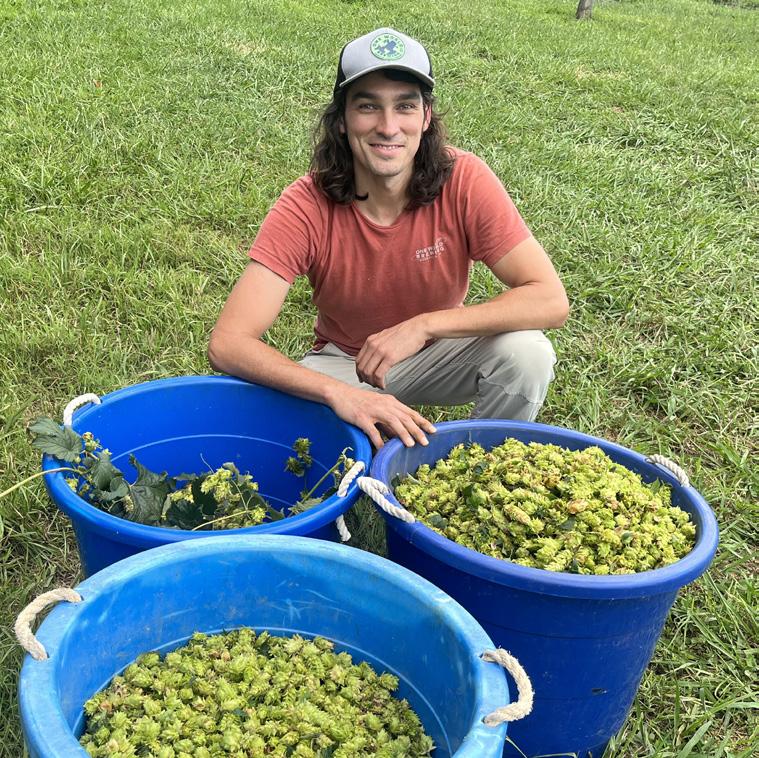
to Grossman. Understanding no location is perfect, they began by looking at what they loved about Chico and what they wanted to avoid in their new location. Desirable characteristics of a new brewery location included proximity to suppliers, nearby cows for the spent grain, community-forward thinking in regards to environmental initiatives, and proximity to product shipping routes.
The company submitted requests for proposals across cities and states that fit their criteria; one original requirement was to not be near other small craft breweries, which cut out WNC as an early option.
After eliminating some of the 250 participants from their requests, the family completed a few site visits without finding a perfect match. They then received a call encouraging them to come look at the Asheville area.
“There was something about Western North Carolina, and when we walked this site in particular, that is so drawing, it’s probably worth us leaving some of the business opportunities on the table for such a great community and pretty amazing spot,” Grossman said.
Sierra Nevada announced Mills River as its new location choice on January 26, 2012, and began brewing their products by the end of 2013. In 2014 they opened their restaurant, and were fully opened and operational in 2015.
Tour programs maintain high guest counts, and the increased brand awareness created a significant consumption jump in the Southeast. Visitors to WNC comprise about 90% of Sierra Nevada’s guests, which total about one million each year to the restaurant.
The Mills River facility is responsible for producing approximately 500,000 barrels of beer each year. Between production, guest relations, and other staff, this location is home to approximately 500 employees.
Having a significant impact on the local
economy, Sierra Nevada also impacts the local brewing community. Members of the NC Craft Brewers Guild as well as the Asheville Brewers Alliance, Sierra Nevada leadership strives to support others in the craft beverage business. Grossman said they work with each other to minimize supply chain impacts and exchange or repair parts, share working industry knowledge, and offer words of support.
With a low barrier to entry during the “craft brewery explosion” around 2016, Grossman saw brewers easily start new craft beer businesses. Now, due to inflation and product shortages, there are far fewer new breweries and a number of brewery closings in the area.
With a wider variety of products on the market, brewers also must maintain creativity in their products to match industry trends. Brewing low-alcohol or non-alcoholic beers, seltzers, readyto-drink cocktails, and kombuchas are some ways to offer alternative options to consumers, but Grossman said there will always be a market for beer.
“The creativity side of brewing right now is sort of endless so we can really innovate, which is really fun for us and for the drinker,” Grossman said. “Craft beer is still a small percentage of the beer consumed in America, smaller than some of the larger domestics or import brands. If we can do a better job still at elevating craft brewers as a whole industry, I think it can help us all.”
Yeast plays a crucial role not just in brewing beer in general, but in certain flavors and aromas brewers are seeking from different varieties of beer, according to White Labs’ Technical Education Coordinator Devin Tani.
Started in San Diego, California, by
Dr. Chris White, White Labs began propagating liquid yeast for brewing beer in 1995. White was a home brewer himself, and wanting to help others create different and better styles of beer, White expanded his work and turned his passion into a business. White Labs made fresh liquid yeast easily available, so local craft brewers were easily able to stop by and pick up the ingredients necessary for their beers.
Noticing the booming craft beer scene in the WNC area and experiencing shipping woes, White expanded his San Diego business to Asheville. The new location grew quickly to match the production of the West Coast location because of the local brewing community’s demand, and now employs 53 individuals.
The number of yeast strains produced is expansive, according to Tani. White Labs
maintains 80 core domesticated strains and keeps more in their vault, and the use of different strains changes the beer styles brewers are able to create.
“If a brewer uses the same hops, water, and malt and only changes the strain of yeast used in a brew, it’s mind-blowing how much that can change the flavor, mouth feel, and color of the beer,” Tani said.
The variety allows small-batch brewers to experiment with their beers, fostering creativity in seasonal or one-off brews. Breweries with staple beers that must be consistent over time are able to easily do so using White Labs’ yeast strains as well.
For brewers looking for specific flavor profiles, Tani said genetic sequencing helps identify differences in strains. Identifying the flavors is the most important aspect, and they can also use genetic testing to determine yeast
performance so brewers know how quickly they can turn out fresh batches of beer.
In addition to providing yeast to local beer makers from home brewers to large brewing facilities, White Labs also helps the brewing community by supplying nutrients and enzymes as well as hosting workshops for brewers.
“We hope to help build knowledge in the community,” Tani said. “With about 80% of the area’s brewers coming to us for their product, we take this pretty seriously.”
The Asheville location recently installed a 30 hectoliter brewhouse in which White Labs is able to hone their recipe to create a more robust medium in which to grow their yeast. This will allow them to cultivate more customizable and precise varieties
continued on next page


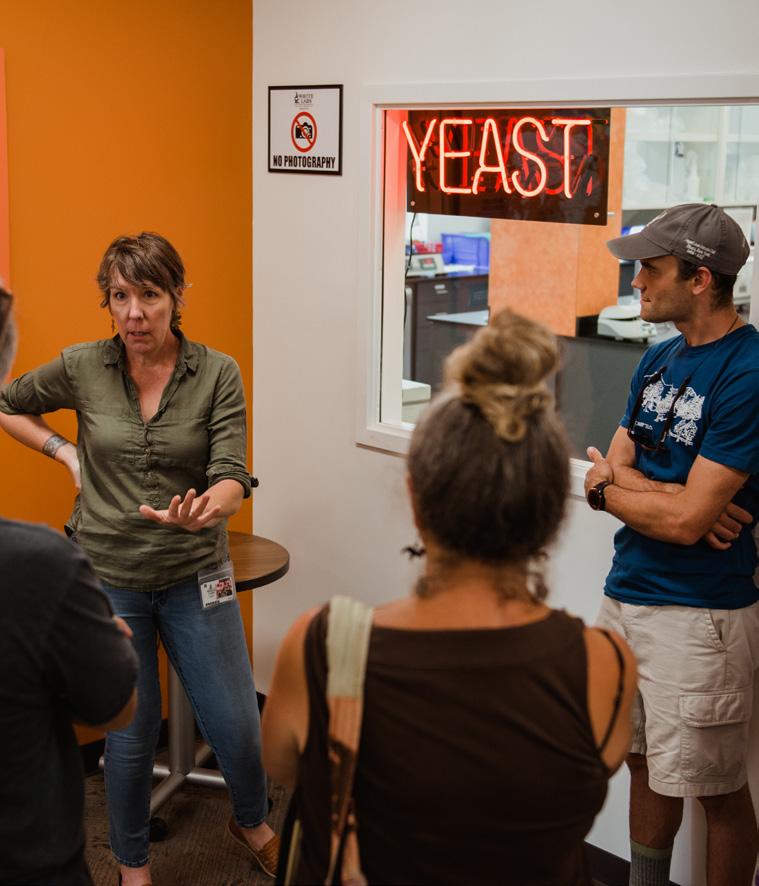
for brewers, providing strains that are more robust and easier to work with.
“Yeast plays such a crucial role in flavors and aromas, and we are an open source for recipes and analytics so people can see how the yeast performs,” Tani said. “People are able to stop by and try our beer, and if they want to brew with that yeast strain, they can. We are not trying to compete with anyone we supply yeast to; our goal is to be an open source for the community.”
A professional brewer for seven years, One World Brewing’s Head Brewer Nick Dumont works to highlight local ingredients through his brews.
While Dumont said it is not possible to source every ingredient locally, having local malt and local yeast available is a “logistical dream come true.” It is easy for him to place an order, and some ingredients are available the same day. He simply gets in his car and drives over to pick up small amounts when he needs them.
One of his suppliers is Riverbend Malt House, and Dumont said the quality of their products is very high, similar to that of European malts. He is able to gather more extract, and the malt produces a higher percentage of sugars than some other maltsters.
“European malts come from a farming system that has been perfected and never affected by prohibition,” Dumont said. “Riverbend’s malts are similar; they’re the best of the best.”
Most malts in the US are a commodity — clean, but nothing out of the realm of expectancy, according to Dumont. They are a generic product, and while some of those are used for One World’s yearround standard products, some beers he produces are made exclusively from Riverbend malt.
Dumont said Riverbend also maintains a local focus on where they source their grains. All of their grains are purchased from farms within a 500-mile radius, and these select farms do a great job of producing high-quality grain of even kernel size.
“This helps put dollars back into the local economy,” Dumont said. “It impacts business because Asheville is very passionate about supporting local agriculture, and I’m happy about partnerships that can help support the local farming community.”
Trying to give as much business as possible to the local supplier is not only helpful for logistics and the local economy, but the high quality of the malt and the unique heirloom varieties support his goal of creating unique flavor profiles.
“I’ve recently worked with an heirloom corn malt called Hickory King consisting of white corn kernels that smell just like fresh tortilla chips, and another red variety called Bloody Butcher that creates a candy flavor with an almost Belgian quality,” Dumont said. “You don’t find these heirloom varieties from national maltsters.”
A couple of One World’s signature beers focus on highlighting local malt — Ashevegas Pale Ale and Legacy Lager. Switching to local malt in 2022 changed their flavor profiles, and once the recipes were nailed down, these brews have seen an uptick in sales.
Other ingredients are sourced locally as well. Dumont said he was impressed with the performance of fresh liquid yeast from White Labs for his larger batches, though for small batches a dry yeast provider makes more sense as dry yeast is easier to keep on hand.
Hops is another important ingredient in beer, and while WNC is not the ideal location for hops farms, Dumont was fortunate to meet a horticulturist at the Mountain Horticultural Crops Research and Extension Center in Mills River who was the right person at the right time to help him acquire some rare local hops. With the help of NC State University, researchers are working to find varieties of hops that are able to grow and thrive in the local climate.
“Farmers want to start growing some of these varieties, but they are not yet commercially available,” Dumont said. “Some varieties may become available as the hops varieties are bred and dialed in, and some varieties may become proprietary and grown on contract for certain brewers. It would be great for local brewers to be able to choose local hops with the specific characteristics they are looking for, and hopefully that will happen in a few years.”
The local hops Dumont was able to acquire may not be reproduced, but he said it was fun to experiment with. While some customers consistently enjoy their usual brew, others appreciate the creativity and are constantly seeking new flavor experiences, and he is happy to be able to offer that through small batches when possible.
“There are a million different things you can do with flavor profiles,” Dumont said.
“More heirloom grains are coming back into popularity, and more varieties of more ingredients are becoming available locally. With these options, we can do more in small batch brewing, like creating a specific brew for a restaurant or other collaboration. It’s great to have the flexibility and the availability to be creative in our craft and to work with other local small businesses in that way.”
Pushing for a sense of local originality, Chris Denesha and Lauren Turpin cofounded Plēb Urban Winery in 2017. The partners have seen a lust for mimicry in many of Western North Carolina’s wineries, as many boast how much the region has in common with the winemaking regions of California, France,
and Italy, despite heavily-manipulated vineyards and importing large amounts of grapes to supplement their own crops.
According to Denesha, Asheville is a place he felt he could bring a unique product that would be celebrated for its realness, though he had to “jump over hurdles” to get people to even try his wine. Much of his early feedback included people saying they didn’t like NC wine because it was either super-sweet muscadine wine, or varieties like cabernets that were too bitter.
“The authenticity has been challenging,” Denesha said. “People didn’t completely understand North Carolina wine and what it represents, even in Asheville. There has been a reputation earned by poor winemaking or poor practices, and we are trying to break those down.”
North Carolina held the largest winery in the country prior to prohibition, according to Turpin, and maintains the oldest vine in the country. When prohibition ended, some states began planting grapes right away, but for NC, much of the resurgence of the winemaking industry has occurred in the last 20 years, and in WNC, that timeline is even more recent.
Being located “on the frontier of the frontier” as far as NC winemaking goes, Denesha and Turpin are on a mission to discover the true spirit of this area’s wines. They are working through a discovery phase and maintaining the importance of keeping true regional flavors as the focal point of their wine, and also looking at climate and weather-pattern changes to determine what varieties grow well here now, and what varieties will continue sustainable growth into the future.
continued on next page




“With vineyards and winemaking, you have to be thinking in decades,” Denesha said. “A winery owner will be five years into a new business before the first harvest, then after aging for two years, you’re seven years in before you know if your wine is any good. You only get one shot each year, and your business is subject to the elements and weather, so many owners may be resistant to ripping out vines and starting something new because the idea of trying again is hard. Other regions have already gone through that, and there’s no way of expediting that process to do one small test batch. You have to have patience.”
Being the owner, winemaker, and grower is unique in the industry, and Turpin said this combination allows them to have control over the entire process from beginning to end. Allowing their business
to be in a discovery phase, they are not yet adding new oak, tannins, acid, yeast, or sugar in order to get a sense of what the local grapes truly taste like. Not only is this cost-efficient, it gives the grapes a chance to first show what true flavors are going out naturally, which is more sustainable for production as the business moves forward.
The growing portion of the business also strives to support sustainability as well. Not forcing something to grow here that doesn’t belong reduces the need for sprays, fertilizers, and further manipulation. Easier growing methods also mean more ability to pay their farmers enough to continue using these responsible practices.
“It’s about the ethos of planting what grows well naturally,” Turpin said. “We want to be responsible partners, and we
want our consumers to go along with us on that. It’s not just about us; it’s about our region’s journey into winemaking. That’s why our name comes from the Roman word ‘plebeians,’ or commoners. We are the commoners with wine. Hopefully with an honest and transparent role, we will help set that as a new standard for Western North Carolina’s wine.”
Offering products other than beer is an increasing trend in the craft beverage market, according to Moonwater Beverage’s Sales and Marketing Director Eli Cotellese.

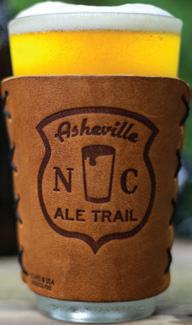


Cotellese’s grandfather was vacationing in Thailand and noticed a THC drink available for purchase. As someone who does not drink alcohol, he was excited to see a different option for enhancing relaxation and having a good time. Talking to his son and grandson upon his return to the US, the family conducted some market research to see if something similar was available here.
While there are many THC or CBD seltzers on the market, they found there was not anyone creating cannabis-enhanced drinks like lemonade or traditional cola. After reaching out to industry connections to formulate ideas, they determined the craft beverage market could benefit by the addition of these types of options.


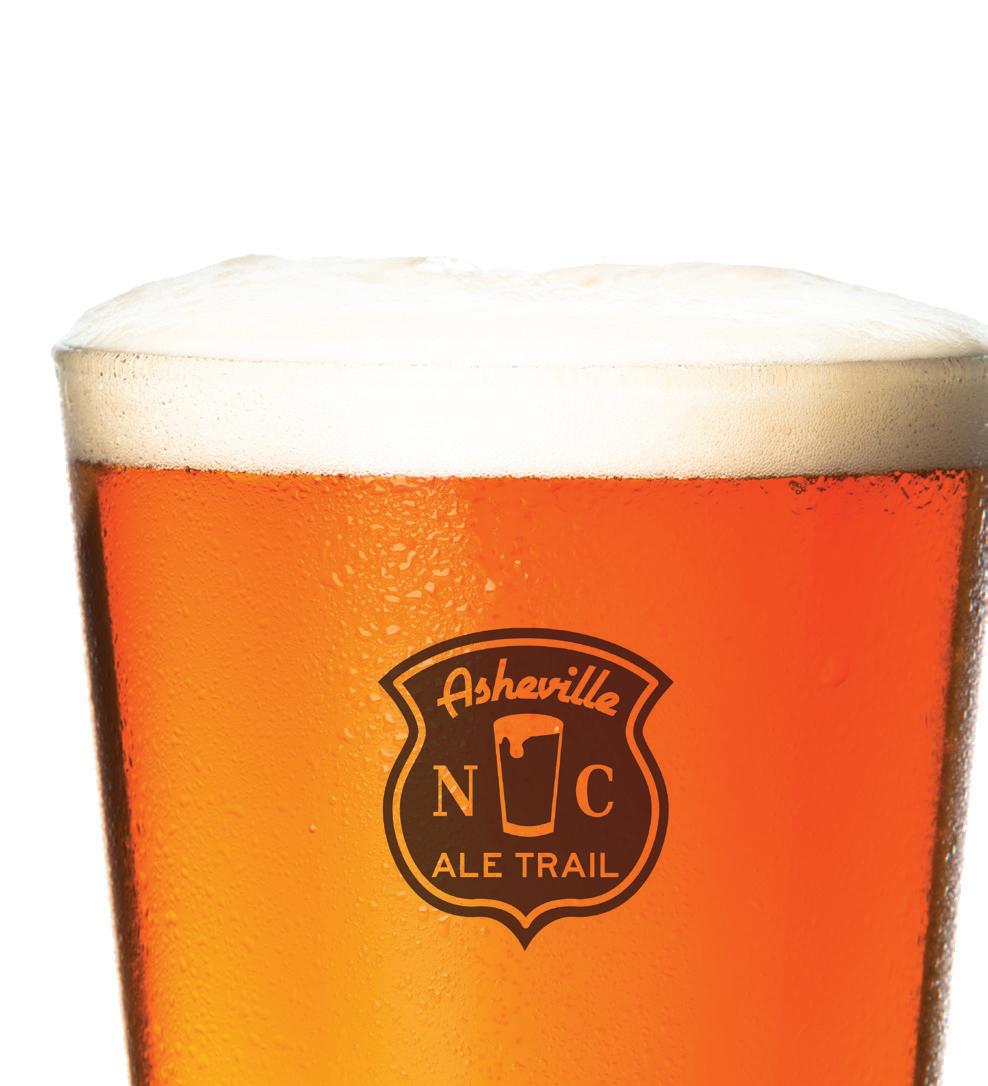

The Agriculture Improvement Act of 2018 authorized the production of hemp, and legalized derivatives of hemp produced in a manner consistent with the farm bill. Cotellese and his family worked to create Moonwater THC Beverages, filling the market gap and creating THC beverages using legal cannabinoid concentrates as described in the 2018 farm bill.
“We want people to understand this is 100% legal, and that it’s okay to enjoy an alternative to alcohol that might still give you a buzz,” Cotellese said. “We’re
also working to reduce the remaining stigma around cannabis being taboo or not allowed versus the fact that there’s no stigma when it comes to people constantly drinking alcohol.”
Because of the vibe that Asheville has, along with its many microbreweries and artistic talent, Cotellese said the area is a great place to begin a craft beverage company. The area has a culture that is supportive of business, and both residents and visitors are more likely to try a new product because it is the “craft beverage capital of America.” Being a very locallyfocused community, Ashevillians in general enjoy trying new local products as they become available.
Moonwater’s THC beverages received positive feedback from many in the industry, becoming available at nearly 70
locations within about six months. While many locations are in Western North Carolina, these products are also shipped into places like Wilmington and Athens, GA, and their footprint is continuing to expand.
This type of craft beverage has hit the market in a timely manner within the industry, as Cotellese said there is positive feedback universally across the board. He sees no competition, only collaboration from all of those pioneering into this new space, and with so many people looking for beer alternatives or removing themselves from the alcohol scene altogether, his grandfather whispered into his dad’s ear at just the right time.
“A product like this is a great alternative for drinkers, as well for smokers who may want the buzz but with a breath of fresh
air,” Cotellese said. “Even in our six months of having our products in the market, we’ve seen quite a lot of development with other companies producing delta-nine drinks as well as an increased curiosity from consumers. It seems there is a new theme coming to light.”
Just as Andy Gibbon began homebrewing before working professionally in the beer industry, he began roasting coffee for himself at home before starting his business — Dynamite Roasting Company — because no one in town was roasting their own coffee beans.
continued on next page

continued on next page
Seeing the need for the product, Gibbon began Dynamite Roasting without a business background, but with a lot of passion and late nights. The business started as a café with a roasting machine in the middle of the shop. Customers enjoying their coffee would see the roasting beans and purchase a bag to take home, which became a hit with people in the area.
Having created friendly relationships within their café, the wholesale element eventually required an industrial roasting machine, a larger space, and additional employees. Dynamite Roasting now roasts about 260,000 pounds of green coffee beans each year with the help of 15 employees.
Engaging with local small businesses, restaurants, and cafés, the relationships that were built impacted the level of growth for Dynamite Roasting.
“These folks are just like me — small business owners with a passion for what they are doing,” Gibbons said. “They are experts in what they do, and we are experts in what we do, and we can work together to have everyone end up in a good place in their business.”
Local business relationships have fostered collaborative opportunities for Gibbons. Highland Brewing Company released Nutz & Voltz, which is a porter with toasted coconut and Dynamite coffee. They have also worked with Hi Wire Brewing on collaborations in the past.
“It’s all about relationships, really,” Gibbons said. “When it comes down to it, if everyone can benefit from what we’re doing, everyone’s business can be sustainable.”
Relationship-building is a key component in Dynamite’s product sourcing as well. Gibbons travels internationally, including coffee-growing destinations like Ethiopia, Rwanda, Sumatra, Peru, Guatemala, Honduras, and more. He said the farmers he visits are just as passionate about
their product and their livelihood as the roasters, baristas, and coffee drinkers.
Establishing regular relationships with their growers guarantees a steady revenue stream for them, as well as a steady supply of quality coffee beans for Gibbons. These direct grower-buyer relationships also allow both sides to get away from the regular market and negotiate prices, ensuring a fair wage is paid and farmers are rewarded for extra quality.
The local businesses that purchase wholesale coffee from Dynamite appreciate the close relationships, according to Gibbon. He said Asheville is fiercely local, and businesses in the area give each other lots of support. If someone runs out of their product, it’s possible to hop in the car and drive it over to the purchaser, or help out if someone’s machines are broken down.
More than business transactions, community relationships are an important part of Dynamite’s culture. Gibbons said it’s important for local businesses to engage with supporting organizations, like contributing product for fund drives with WNCW, working with schools for teacher appreciation events, and helping organizations like Bounty & Soul which offer free markets for the community.
“Participation with these organizations and events is huge for our community,” Gibbons said. “It’s not national brands that help buy jerseys for local sports teams.”
While relationship-building has allowed Dynamite Roasting to blaze through its five-year plan in two years, they are working to maintain positive growth while keeping their eyes on core values. They have been able to say yes to larger corporate accounts, and now have their coffee distributed in various places around the Southeast US. The key, according to Gibbons, has been making sure the business continues to feel good while maintaining product quality and positive relationships.
“Proper money management and treating your employees right will always be keys to a successful business, but you also have to continue to be interested in what you are doing,” Gibbon said. “Small businesses are made up of a bunch of people passionate about what they do and passionate about their community. Running your business is supposed to be fun. If you enjoy it and you are passionate about it, it all sort of has a way of working out.”
The Alliance was formed in February 2009 as a trade and membership organization dedicated to promoting Western North Carolina craft beer and breweries. The ABA’s primary mission is to promote WNCcrafted beer and provide member education and support.
Learn more at AvlBrewers.com.
North Carolina boasts the largest number of craft breweries in the American South, with more than 380 breweries and brewpubs. The mission of NC Craft Brewers Guild is to advance the interests of the craft breweries of North Carolina and to promote North Carolina craft beer.
Learn more at NCBeer.org.
—
Find a comprehensive list of resources for businesses and organizations of all types at WNCBusiness.com/Resources.

The first beverages Matthew Rentz created were not cocktails, but coffee drinks. Entering the service industry via Starbucks, Rentz quickly realized he enjoyed the work of blending different flavors and consistencies to create great drinks.
Moving to New York City in 2015, Rentz waited tables and tended bar at a small establishment where he learned how to create proper cocktails, when to shake versus when to stir, and was promoted to their general manager at age 25. He then transitioned to The NoMad, a well-known hotel bar created by the owners of the prestigious and globally popular Eleven Madison Park restaurant.
“It was a great experience,” Rentz said. “I served many dining rooms and worked many events and made great money, I wasn’t behind the bar very much. I did gain an education and appreciation of the cocktail industry and learn from some of the industry’s major players.”
When the COVID-19 pandemic began closing bars and restaurants, Rentz and his wife relocated to Asheville. After working at several places, he found a position at Antidote at Chemist Spirits. Antidote
was appealing as the business is focused on creating finely-crafted cocktails, something he has always enjoyed.
“I also love the simplicity of the cocktail lounge,” Rentz said. “It’s a weird spot in the middle of ‘Beer City’ and I appreciate the difference. Antidote reminds me of an old New York City bar — eclectic and elegant at the same time. It’s the nicest and coolest-looking bar in town.”
Rentz’s fun begins as he arrives for his shift. Before the bar opens, he and the team prepare ice, garnishes, and batched cocktails, making sure everything is clean from the previous night’s shift and ready for the new day. The team chooses “pumped up music” to listen to while they prepare, building energy and positivity before guests come in. They joke around and ensure morale is high, and also keep each other accountable. Rentz said he appreciates how each individual is able to take their job seriously while having a good time at work.
“Sometimes it gets busy preparing for a shift as crowds of people gather at the gate,” Rentz said. “We try to prepare for the rush of people once the gate is unlocked by leaning into what people typically order, as familiar cocktails like espresso martinis and old fashioneds are often in high demand.”
Associated with the Downtown Asheville distillery Chemist Spirits, Antidote features many of their spirits in their signature cocktails. Antidote is the first to receive new products and new blends, and the bartending team creates cocktails specifically to show off the flavor notes of these spirits. The distillers or bottle shop crew often share suggestions for how to bring out some of the flavors of these
blends, and Rentz said tweaking recipes and working through the creative mixology process is his favorite part of the job.
“While the bar highlights the ‘old school prohibition style’ and features many ginbased cocktails, we want to make sure everyone is comfortable,” Rentz said. “We use a variety of spirits and keep rotating menus created by the bartending staff. Bartenders-in-training often get taken under the wing of a team member and are encouraged to create new cocktails too. There always ends up being something for everyone on our menu.”
After being connected to one of the most successful restaurants in the world, Rentz said he is excited to see craft cocktails getting more attention in Beer City. Visitors from out of town have heard of Antidote and have it on their list of places to visit while they’re in town. He and the team take their jobs seriously, despite sometimes hearing comments like “when are you going to get a real job?”.
“It feels good to play a part in building recognition of the business,” Rentz said. “There’s a huge sense of pride, good morale, and good work ethic on our team. While some people may look down on those working in the service industry, it’s incredibly rewarding. More people are taking craft cocktails seriously, we are getting noticed, I am good at what I do, and it feels good to feel like we are doing important work. We have the look, the feel, and the substance, and I feel happy to be helping make this bar another Asheville destination point.”
— Matthew Rentz is a lead bartender at Antidote. Learn more at Antidote.bar.

“ By offering fresh food, live music, play spaces, and a shop in addition to the orchard itself, we’re creating an atmosphere on the farm that the whole family can enjoy. We want the hard cider to stay in that space.”
- Jocelyn Hunsader
On a piece of land that has been used as a farm in Henderson County since at least 1813, Jeter Mountain Farms was established in 2005, with an apple orchard planted in 2014.
The Hunsader family has been farming for more than five generations, and understanding he was ready for more rewarding work, Mike Hunsader knew he wanted his new apple orchard to become a place to share his passion with everyone in the community as they come and enjoy the literal fruits of his family’s labor.
With the goal of offering more than simply a U-Pick orchard, the Hunsader family knew they wanted to produce a variety of products to create a full experience for their guests, and they wanted to start by offering hard and fresh cider.
“We knew we wanted to offer that and we knew we wanted to nail it,” said Jocelyn Hunsader, Mike’s daughter-in-law. “We are careful with how it’s made through the entire process. The first step in making good hard cider is to make good fresh cider, so it’s all freshly grown, pressed, and processed on site.”
Holding true to their standard of producing cider simply and honestly, their cider is made from only pure products, never
adding any sugar or flavor concentrates. The fermented cider is back-sweetened with more fresh cider, and the fresh cider is pasteurized with a UV process rather than heated so the flavor is never compromised.
The first year, Jeter Mountain Farms brewed The Original — a standard hard cider made from a blend of apple varieties. Over the years, they’ve added The Granny which is made from only Granny Smith apples, The Pink Lady, Grape, and Blackberry, all using only fruit grown on their own farm.
“We’ve had fun adding more flavors over the years,” Hunsader said. “We also do specialty small batches available only on tap like a hopped hard cider and a whiskey barrel-aged cider. This coming season, there will be a few new things coming too.”
Intentionally keeping their craft small, all of the work, including the canning, is done inhouse. Their cans are only available at the farm, and Hunsader said this is to further their goal of encouraging enjoyment of the farm experience. There is something special about things you have to wait for, and they plan to continue focusing their energy on keeping up with the demand on the farm itself.
“While we try to increase our capacity a bit more each year, the hard cider is just part of the experience we offer at the farm,” Hunsader said. “By offering fresh food, live music, play spaces, and a shop in addition to the orchard itself, we’re creating an atmosphere on the farm that the whole family can enjoy. We want the hard cider to stay in that space.”
The work on the following year’s hard cider begins days after the U-Pick season ends. The family picks any leftover apples and immediately presses them all, getting the fermentation process started right away. They switch the use of their large cooler to become a fermenter, and work on the product all year long in order to have enough for the following season.
As the farm grows in popularity, the Hunsader family plants more apple trees every year. Each tree takes about five years before it begins producing well, and having enough to keep up with the demand is challenging, even with their current 40 acres of trees.
In addition to the hard cider, the family works together to create the other offerings available on their farm. They smoke their own pork barbeque and make their own sauces for their food truck, produce their own honey, and built their own picnic tables. Hunsader’s motherin-law even handmade all of the signs found on the property and also creates jewelry and printed water bottles and tote bags available for purchase in their market store.
Visitors will see family members working the farm and offering its products every season. Hunsader said anyone who picks an apple will meet her father-in-law whether they know it or not, and while their goal is to grow, their growth remains centered on creating a better experience for those visiting rather than becoming bigger or more far-reaching.
“We always strive for excellence, and are lucky that we are a big family so that we can divide and conquer,” Hunsader said. “We want to accommodate the best experiences with charm and use the property more wisely to create the best possible spaces for people to come and enjoy. It’s a true family affair, and we are proud of all that we are able to offer as a reflection of our farm.”
—
Jeter Mountain Farms is a U-Pick orchard and events venue in Henderson County. Learn more at JeterMountainFarm.com.
WNC

According to Riverbird Research, the number of jobs in the region’s outdoorrelated industries (Modified Purdue Cluster Definition) increased over the five-year span between 2018 and 2023.
The 15% increase in the number of industry jobs in an 18-county region of WNC was greater than the state’s 11% growth rate, and the concentration of jobs in the region was 2.6 times the national average.
The total of 8,323 jobs supported by the outdoor recreation industry in the region occurred across 424 payrolled business locations, and earned an average annual salary of $38,563.
The highest concentration of these jobs occurred in Buncombe County which
supported 2,930 of these jobs, followed by Henderson, Avery, and Watauga Counties which supported 804, 782, and 715 jobs, respectively.
According to Riverbird Research, the number of jobs in the region’s summer camp industry increased over the five-year span between 2018 and 2023.
The 18% increase in the number of industry jobs in an 18-county region of WNC was slower than the state’s overall growth rate of 29%; however, the concentration of jobs in 2023 was 10.3 times the national average. The total of 853 jobs supported by the summer camp industry in the region occurred across 47 payrolled business locations, and made up approximately
60% of the state’s overall estimated 1,419 jobs in this industry. The average annual salary in this industry in 2023 was $34,978.
The highest concentration of these jobs occurred in Henderson County which supported 309 of these jobs, followed by Transylvania County which supported 257 of these jobs.
Western North Carolina’s outdoor industry popularity is anchored by a plethora of recreation possibilities. Between Great Smoky Mountains National Park, Pisgah
National Forest, Nantahala National Forest, the Blue Ridge Parkway, the Appalachian Trail, and a variety of state parks, forests, and recreation areas, the region continues to draw visitors and new residents alike to enjoy the outdoors.
The Blue Ridge Parkway was the most visited national park in the country in 2021, followed by Great Smoky Mountains National Park, bringing a combined 30 million visitors to the area. A regional collaborative identified $773 million in GRP and approximately $1.4 billion in sales in 2020.
In 2023, a story map titled ‘Outdoor Industry and Gear Production in WNC’ was created in a collaboration under an EDA Grant, led by the Land of Sky Regional Council. The partners were LOSRC, SW Commission, High Country Council of Government, and Riverbird Research/Asheville Chamber; supported by NC Biotech Center, Outdoor Gear Builders, and the North Carolina Economic Development Partnership. Paul Moon with LOSRC was the project manager and Erica Anderson helped lead the project.
WNC’s landscape and outdoor amenities have created a hub for outdoor gear manufacturers. The manufacturing activities create a strong local supply chain for adventure providers, and in 2020, $42 million of the $122 million, or 34%, spent on industry-to-industry purchases occurred in WNC.
Because of the growth of the industry, producing a skilled workforce to support the industry is a necessity. The seven manufacturing industries supporting outdoor gear creation saw a 79% jobs growth rate from 2015 to 2020, and education and workforce development programs at local institutions of higher learning have increased to keep up with demand.
During the COVID-19 pandemic, some outdoor gear manufacturers shifted to the medical market. Kitsbow, a cycling apparel manufacturer, shifted to producing cloth
masks and was recognized by the New York Times as “the best reusable face mask on the market.” Within two years, their 143,000 masks produced contributed to more than $3 million in sales.
Camper trailer manufacturer SylvanSport quickly shifted to producing face shields with the goal of keeping employees working. The team “didn’t lose a single payroll hour,” and produced more than 100,000 shields during the first year of the pandemic.
Increasingly renowned as the “Eastern capital of the outdoor industry,” the sector is expected to add 1,200 jobs by 2025.
For more details, visit RiverbirdResearch. com/Featured-Projects and click Outdoor Economy Collaborative (I or II).
Started as a collaboration of outdoor gear manufacturers in 2013, the former Outdoor Gear Builders transitioned to the Outdoor Business Alliance in 2023. Executive Director Matt Godfrey said the organization’s mission changed in order to be more inclusive of all sectors, creating an opportunity to be mutually beneficial for any business that may be in any way involved with the outdoor industry.
The Outdoor Business Alliance’s goal is to foster a prosperous outdoor business community by cultivating, connecting, and supporting WNC’s outdoor industry. Godfrey said this is done with a collective membership of nonprofit organizations, retailers, experiential-based companies, skills instructors, and professional services working in collaboration with the area’s gear manufacturers. As the Alliance transitioned from its former name, 59 new members were added to the collective.
“The outdoor industry is mostly made up of small companies, but they come continued on next page
7,247 Jobs in 2018
8,323 Jobs in 2023
15% Job Growth
1,076
2018-2023 Change in Jobs $38,563
2023 Average Annual Wage Excluding supplements
424 Payrolled Business Locations in 2023
The concentration of jobs in the 18-county region was 2.6 times the national average.
2018-2023 employment growth of 15% was greater compared to the state’s 11%. Self-employed
(NAICS
The concentration of jobs in the 18-county region was 10.3 times
together collectively as a big industry,” Godfrey said. “One of the main benefits is always connecting, and having a platform facilitating that creates a larger community and a larger network. Launching the rebrand was definitely a contributing factor in gaining new members who want to engage and collaborate within that space.”
The growth of the organization reflects the continued growing realization of the impact of the outdoor industry across the country. The increasing number of people Godfrey sees enjoying outdoor spaces in a variety of ways can play a role in economic development, healthier communities, job creation, expanding diversity, and environmental awareness.
“There are more people in the outdoor space, which means more appreciation for physical and mental health and more protection for the areas where we recreate,” Godfrey said. “We must take care of those spaces. Maintaining and protecting our spaces continues the potential for these areas to be enjoyed by outdoor enthusiasts, and if they get overrun, we won’t have that.”
A concern of the Alliance and many outdoor enthusiasts is the effect the industry’s growth will have on the spaces themselves. If the spaces become overcrowded and/or damaged, there is a possibility of a reduction in the profitability from the consumer base that will purchase gear and experiences. Godfrey said protection and profitability go hand in hand, and he is excited to see outdoor conservation nonprofits as part of the Alliance’s new members.
The 2023 Outdoor Industry Conference hosted multiple business alliances from around the state and the country, and according to Godfrey, the conference gave each alliance an opportunity to learn what the others are doing. What he heard was all outdoor business alliances are underfunded and understaffed for the impact they have and the number of businesses which are supported.
“We are funded by the Appalachian Regional Commission and have one director and a board that helps fill gaps, but we could use another full-time staff member and then some to have a greater impact,” Godfrey said. “We saw that with alliances across the country.”
Many alliance leaders want to get to the point of sustainable operations in order to be self-funded, rather than requiring grant funding for operations, which can be a challenge. In other states, some alliances are funded by private means, partners, or specific foundations, and the OBA continues to research potential sources.
“It’s such a huge economic driver, especially for rural communities,” Godfrey said. “This is an opportunity to leverage dollars and keep them local. We all strive to be the best we can be, and hope to lead to business growth, job connections, and attract other businesses here. This is all because of the existing business community.”
Great Smoky Mountains National Park has the distinction of generating more visitor spending and subsequent economic output than any other unit of the national park system, according to the National Park Service’s Tourism Analyst Donald Leadbetter.
The 2022 Visitor Spending Effects report, a collaboration of the National Park Service and the US Geological Survey, stated 12.9 million park visitors spent an estimated $2.1 billion in local gateway regions while visiting Great Smoky Mountains National Park. This spending supported a total of 32,600 jobs, $1.2 billion in labor income, and $3.3 billion in economic output across the Park’s gateway communities.
In 2021, the total economic output of the
continued on page 62


park was $1.8 billion, demonstrating a 45% year-over-year increase between 2021 and 2022, the most significant yearly increase to date. The majority of the $3.3 billion in economic output directly affected sectors including hotels, restaurants, recreation industries, and retail, and approximately 44% of that occurred in North Carolina.
Leadbetter said the record increase is likely due to a combination of two factors. The key source markets for the Park, the Carolinas, Georgia, Tennessee, and Florida, all saw rapid population growth following the start of the COVID-19 pandemic. The pandemic was also a catalyst for the growth in outdoor recreation in general, and paired with easily drivable access for millions of people, visitation to the Park spiked.
“I’ll also observe that while the park is clearly the central draw for the region and sits at the heart of the brand, “The Smokies” is a much larger destination that encompasses many communities in Tennessee and North Carolina,” Leadbetter said. “The combined marketing, promotion, and word-of-mouth generated by all of those communities, businesses, residents, and visitors keeps
the area top-of-mind for many people when they’re making plans for tourism, leisure, and recreation.”
Public Affairs Specialist Emily Davis said visitation surveys asking the primary purpose for visiting the National Park runs the gamut of possible activities. Some popular responses include hiking, scenic driving, and wildlife viewing, and many visitors feel they have a family connection to the park.
According to the Great Smoky Mountains’ Foundation Document, one of the reasons people enjoy visiting the Park is the opportunity for solitude and unconfined recreation. With 848 miles of maintained trails throughout the park, the remoteness and lack of development can engender a strong sense of solitude in visitors and allow ample opportunities for a primitive type of recreation.
There is a historical and cultural element to the draw of the Park as well. It contains one of the largest collections of 19th century remnants, a testament to the rich Appalachian folk history of the region. There are also preserved Cherokee and other Native American archaeological sites throughout the Park’s wilderness.
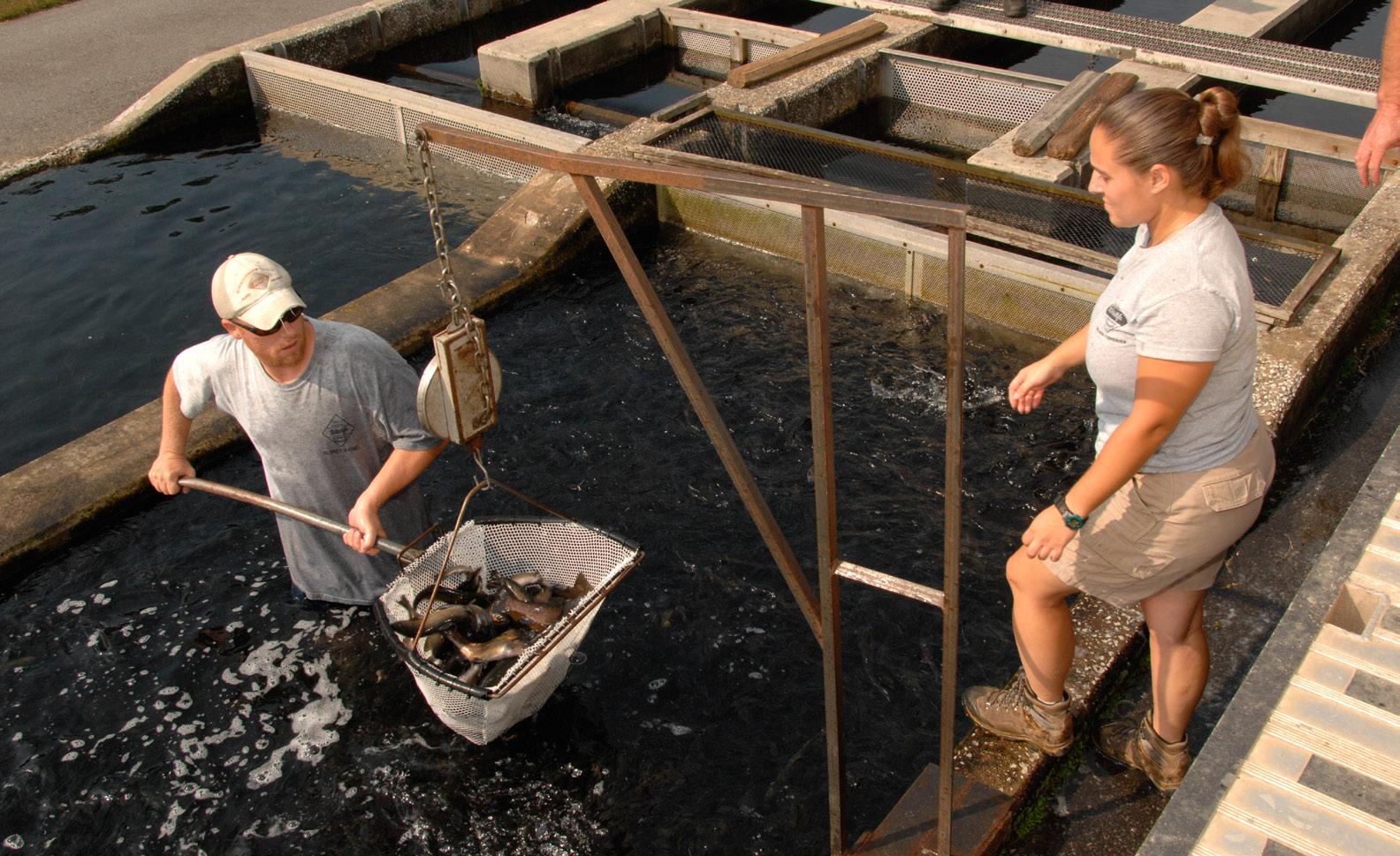
Davis also noted that many visitors make a stop in the Park as a part of their larger “Smokies experience.” She said with so many activities in the Park’s gateway communities, people make an entire vacation out of experiencing all the area has to offer.
Local communities are highly involved in the Park’s activities, according to Davis, and this was the idea when the Park was originally established. As there are no businesses operating within the park, the gateway communities provide services like lodging, food, and beverages. Businesses directly supporting Park activities have been established, including shuttle services to hikers adventuring on point-to-point hikes.
“Having a national park in a local community is a huge economic benefit,” Davis said. “National parks are tremendously popular. Visitors come from across the country and around the world, and it creates an enormous return on investment for these communities.”
In 2023, the NC Wildlife Resources Commission released a report sharing the economic impact of trout fishing in North Carolina. As the habitat of trout is primarily cool mountain streams, the majority of this impact occurs in WNC. According to the report, approximately 369,968 individuals fished for trout in 2022. These anglers spent a collective 4.6 million days fishing for trout with the average angler taking nine trout fishing trips. On average, North Carolina trout anglers spent $240 per trout fishing trip, which totaled $587,553,393 on trip-related expenditures in the state. In terms of equipment-related expenditures, North Carolina trout anglers spent $770,570,566.
Trout fishing also directly and indirectly supported 11,808 full- and part-time jobs across the state, creating a labor income of more than $535 million. The overall economic impact of these trout fishing
expenditures in North Carolina in 2022 was $1.38 billion. The Social Accounting Matrix multiplier indicated that for every dollar spent on trout fishing in North Carolina, there was a $1.93 return to the state economy.
Anglers reported fishing the most in Ashe, Watauga, Avery, Jackson, and Haywood counties, and fishing mostly on public lands. With about 72% of fishing triprelated expenditures spent in the county of their typical fishing site, the sport is significantly impactful to the economy of these areas.
With 48,000 anglers traveling from out of state, impacts also filter into the hospitality, food and beverage, and retail sectors of the economy. Considering both in- and out-of-state anglers, Trout fishing had the biggest impact on the retail and sporting goods sector, which had a direct impact of $115 million. Other significant expenditures included items like vehicle and boat fuel, guide and charter fees, groceries, and camping supplies.
The Commission’s Lead Social Scientist Cristina Watkins compared the 2022 data to the 2015 trout fishing report, noting more people trout fishing combined with general inflation creates a tremendously increased economic impact on WNC.
“We are hearing from anglers around the country that North Carolina trout fishing puts a checkmark on an experience they’d like to have,” Watkins said. “There are plenty of opportunities and places to fish, long open seasons, and the ability to fish in the winter. In addition to the trout themselves, fishing in North Carolina is unique and special for a lot of reasons.”
The Public Mountain Trout Waters program manages areas in the 26 westernmost counties of the state. Hatcheries collectively stock about a million fish per year, primarily in the spring and fall. With partnerships with the US Forest Service, state parks, and private landowners, the program determines which streams can be stocked. The
program’s biologists also evaluate the health of stream habitats as trout need clean, cold water to thrive, which can also help determine stocking times. Watkins said it was calculated that for every dollar spent to produce and stock trout, about $780 is returned to the state’s economy, and will continue to impact the outdoor recreation industry and various related sectors into the future.
Regarding the 2023 report, Inland Fisheries Chief Christian Waters said, “The report reveals impressive and useful data to our agency. This information provides a resource we may use in determining priorities and strategies for the PMTW program. It also illustrates the beneficial effects of our efforts to support trout angling for North Carolina and its impact to constituents, specifically local municipalities and businesses. Trout stocking is one important element of our trout program and why we’ve secured funds to renovate one of our fish hatcheries we use to raise and stock trout for Western North Carolina.”
*Above data shared from the NC Wildlife Resources Commission’s 2023 trout report titled “Evaluation of North Carolina Trout Anglers’ Opinions, Participation and Socioeconomic Impact.” Learn more at NCWildlife.org/Learning/Species/Fish/ Trout/Trout-Fishing.
Outdoor recreation and its impact on tourism in WNC is a growing trend, according to Nantahala Outdoor Company’s Director of Outpost Operations Steven Foy.
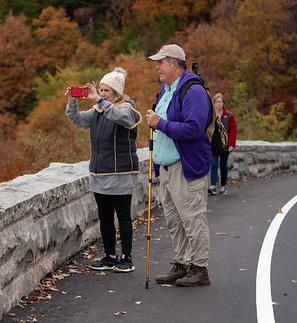
a typical curve would be excluding outlying data from extreme years.
“I’m sure this is true for noncommercial sites like DuPont State Forest and other parks just as it is true for commercial operations,” Foy said. “People return to do business with us because they have a great experience, but that experience is paired with amazing natural amenities. Almost any outfitter will say it’s only as strong as its natural resources, and they pretty much sell themselves. For us at NOC, our staff work hard to deliver a great product, but it’s also that the rivers are so beautiful.”
While NOC began operations in 1972, Foy said people have been coming to WNC for adventures for longer than that. Many commercial outfitters and operators began their businesses in the early 1970s, and many of the original staff at these companies attended local summer camps in their youth.
The summer camp industry plays as much of a vital role in the outdoor recreation economy as the outfitters, ski resorts, and gear manufacturers in the area, according to Foy. With so many campers arriving from all over the US and even international locations, a large number of their parents
While many tour companies experienced decreased numbers in 2020, demand at NOC was “through the roof” in that year and continuing into 2021 and 2022. While some operators saw a softening in 2023, Foy felt like industry conversations still indicated a consistent growth along what continued on next page

stay in the area to experience the area’s outdoor recreation opportunities for themselves.
There has also been growth in the summer camp model that incorporates local outfitters into their offerings. NOC and other rafting companies take campers on rafting trips as part of their programs, and outfitter staff help provide certifications in things like first aid, CPR, and wilderness medicine to camp counselors.
“There’s been a big growth in this type of camp model in the last decade,” Foy said. “It’s become a critical element of business, and we’re grateful for the visionaries who helped establish that in the Hendersonville and Black Mountain areas. We’re even seeing those aging out of summer camp programs become interested in working as guides. It lends so perfectly to be a cooperating business model.”
Retail gear sales are also a large part of NOC’s business model. Some guests experiencing water sports through tours fall in love with the activity and want to continue on their own. Large pieces of gear and equipment are not easy to ship and can be difficult to try before you buy, so the company has partnered with local manufacturers, allowing the staff to demonstrate gear sold in NOC stores on the river. While not located on the river,
NOC’s store at the Grove Park Inn is primarily a retail store but also connects guests to activity options, so the retail/ recreation relationships go both ways.
Foy has also seen students of paddling school turn the sport into their career. Rivers in the Southeast have a longer season and more predictable water levels than other regions that may be dependent on things like snow melt, so the volume of work in the region is attractive to river guides. Some come from places like Florida for the high season and live in WNC for the summer, and many college students from around the country do the same. Others make their seasonal guiding schedule work with other careers like construction or education. Many retirees also temporarily relocate to WNC to guide in the summer.
While some seasonal tour guides, on rivers or otherwise, come to the region to work, play, and be active for a short period during their “regular life,” others start guiding and build an affinity with the company. Individuals who started as guides have built their career and the business, becoming key players in marketing and accounting at the company.
“Tour operators may be small businesses in numbers of employees, but we are big as far as the economic impact of bringing
people to the area,” Foy said. “At NOC, across four states, we have between 750 to 775 employees at the height of our season. It’s also telling that in any economic conversation, outdoor service providers are a key element. We take more than 110,000 people on guided rafting trips annually, about 70,000 of those on the Nantahala and French Broad Rivers. Most of those visit in conjunction with other activities, and they buy gear and food and stay for a few nights. That’s a significant contribution to the economy based on the great outdoors.”
While WNC is the hub of overnight summer camps in the state, Henderson County is home to 20 of those camps, comprising one-third of the total camps in a fourcounty area and a $110 million economic impact.
Henderson County Chamber of Commerce President Bob Williford said the economic impact is due to more than the camps themselves. As the parents of campers often explore the area during pick-up and drop-off times, they spend time and money at hotels, restaurants, shops, and attractions in the county.
“The impact spreads farther than you may see,” Williford said. “The airport gets busy with campers flying in, businesses like Mail Box & Pack see increased shipments as parents ship trunks to camps, local construction companies are often working on updates and repairs at camps, local foodservice distributors serve our camps, and local laundry services are used for camp linens. Camps partner with area businesses like Nantahala Outdoor Company. Even local ice cream shops are frequented by campers when they get special rewards for things like the cleanest cabins.”
The North Carolina Youth Camp Association was formed in Henderson
County, according to Williford. This organization helps foster cooperativeness within the camp industry, expand public understanding of camp programs, and represent the industry with policy makers at local, state, and federal levels. With 45 member camps located in the WNC region, the NCYCA plays a major role in the region’s summer camp industry.
A variety of businesses have been established in the region because their owners attended a WNC summer camp and fell in love with the area. Williford said the owners of Hendersonville Outfitters, Three Chopt Sandwich Shoppe, and other restaurants and outdoor recreation businesses were introduced to the community through their camp experience.
“You’ll find them all over,” Williford said. “So many leaders in our business community came here in their youth, enjoyed their time, and made good memories. Now they have become an integral part of our community.”
Community leaders are also advocates for the industry. Former Henderson County Commissioner Chuck McGrady was an owner of Falling Creek Camp in Zirconia and has served as the national vice president of the American Camp Association, and has shown support of the camp industry and general health, wellness, and community development. He is a past president of Conserving Carolina, Friends of DuPont Forest, and Muddy Sneakers — all centered around the impact of outdoor recreation and summer camp in the area.
The Henderson County Chamber’s annual Camp Field Day event is held in support of the County’s summer camp industry. Many of the area camps participate because it introduces the business community to the camp and the amenities and activities offered. During each Camp Field Day event, local speakers discuss the social and economic impact of the industry before participants compete in camp
games like rock wall climbing, canoe racing, tent building, and arts and crafts activities.
“Summer camps are really a big deal here,” Williford said. “You can easily tell when camps have a drop-off or pick-up day just by looking downtown. Families will be walking along Main Street with their kids in camp shirts, and there will be huge lines at many restaurants. The whole town is busy on these days. Camp impacts ripple through our entire community.”
Summer camps have been operating in WNC for more than 100 years. Keystone Camp was established in the summer
of 1916, quickly followed by others like Camp Carolina, Camp Greystone, and Rockbrook Summer Camp for Girls, according to Rockbrook’s Director Jeff Carter.
The mountains were a retreat for people who lived along the Southern East Coast to escape the summer heat. Parents spending their summers in the mountains wanted an opportunity to create an experience for their children. As modern life began to leave out certain valuable aspects of daily life, camps began offering a special environment in which to highlight these principles and values.
“It’s simply healthier for children to be in an environment where they can be in nature, be active, and learn outdoor skills being lost to modernity,” Carter said. “This was true 100 years ago, and continued on next page


it’s even more true today. Modern life has a lot of things that make it difficult for kids to be the way they want to be — spending time outside, exploring, and connecting with nature without societal pressures. Camp experiences also offer opportunities to create connections with others, become more self-aware, and build better friendships.”
Summer camps are a haven; a refuge to escape pressures and influence of modern life, according to Carter. They offer a chance to return to something more basic. Campers can relax and be their true selves which allows them to become more joyful, more human, and more open to each other. This, in turn, allows campers to create very close, authentic friendships they may not otherwise have an opportunity to build. Carter hears campers say they feel good about who they are and their place in the world when they attend camp. Children are immersed in a culture where they are encouraged by enthusiastic role models to notice the richness of the world itself. They practice treating each other with care and kindness, and are able to drop expectations of “who they should be,” which children say feels refreshing.
“These kids have been missing out on key parts of life that our current education system lacks, and they don’t even know it,” Carter said. “The American Camp Association has a notion that when kids attend camp, they gain real world skills that are educational in the best sense of the word. They learn skills like communication, listening, leadership, and confidence that allows their true selves to shine. That’s why it feels so good.”
Camp traditions dating back generations help to keep this feeling alive, according to Carter. Books of songs date back to the area’s original camps, and campers gather to sing them together daily. Special ceremonies and whole-camp gatherings give testament that “we are all in this together” and help define the community. These traditions are focused
on strengthening bonds among campers, and lead to a feeling of belonging and ownership.
“We often hear people refer to the camp they attended as ‘my camp’,” Carter said. “These traditions definitely play a role in keeping people returning year after year, and also generationally. Campers of years ago have experiences that have meant so much to them, and they want to pass that positive experience along to their children. We are now seeing fourth- and even fifth-generation campers.”
While some things have changed over the last 100+ years, there is a fundamental
EDPNC’s Outdoor Recreation office focuses on economic development, education and workforce training, conservation and stewardship, and public health and wellness, to ensure the state’s strategic growth as a place where outdoor businesses and recreation communities can thrive.
EDPNC.com/Industries/ORec
Composed of several programs and partnerships including Mountain BizWorks, Made X Mountains provides entrepreneurial support, networking, and collaboration to outdoor brands of all sizes around Western North Carolina.
MadeXMtns.com
desire among summer camps to continue offering a similar experience providing positive enrichment that allows campers to break away from their typical routines. Each camp may have their own traditions, amenities, and activities, but Carter said they all offer the same value and impact.
“Camp means a whole lot to the people that come here,” Carter said. “Real life tends to isolate people, and camp offers the opposite of that. Campers realize how impactful their experience was and they yearn to have that again. This makes a difference to people in their future, and that’s why they keep coming back.”
The Outdoor Business Alliance fosters a prosperous outdoor business community by cultivating, connecting, and supporting WNC’s outdoor industry.
OutdoorBusinessAlliance.org
North Carolina’s Outdoor Recreation Industry Office works to grow and support the outdoor recreation economy at the state level through collaboration with existing outdoor businesses, local governments, and communities that rely on a richly diverse outdoor recreation landscape.
OutdoorIndustry.org/State/ North-Carolina
— Find a comprehensive list of resources for businesses and organizations of all types at WNCBusiness.com/Resources.

In May, when the water temperature becomes warm enough, local construction worker James Smithdeal adds Tour Guide to his job title.
GreenFlash Watersports is a unique company offering weekend tours along the French Broad River with stops at breweries in the River Arts District. 2024 will be Smithdeal’s fourth season guiding guests down the river.
The majority of his guests are tourists to the area who find GreenFlash through their AirBnb rentals. He calls himself a ‘facilitator of friendships’ or a ‘river bartender’, as he introduces the area to visitors and visitors to each other as they float down the river and enjoy local brews.
“It’s fun to have a mixed group of people from a variety of places,” Smithdeal said. “Usually after our first beer at our first stop, it’s easy to get everyone talking. Throughout the day, we all become friends, sometimes connecting on social media and keeping up with each other for a long time.”
Smithdeal said he really enjoys hanging out with his guests, allowing the group to dictate the speed of the tour. Tours can
range from four to six hours, depending on the weather, how much fun the group is having, and if any participants have evening plans.
Tour guests’ vessels can vary as well. Some choose kayaks and others choose standup paddle boards, but Smithdeal prefers the SUPs because he can see everyone in the group more easily. GreenFlash also has new hybrid SUPs with seats, which he said is great for guests who are new to the sport.
Regular paddle boards are easier than they look, according to Smithdeal. After an instructional briefing, guests learn to find their center of balance and how to steer, and the tour down the river goes easily. This learning curve is different for everyone, and sometimes guests need a bit of extra attention and demonstration, but he said most get the hang of it within about five minutes.
“The French Broad is a great, easy place to start out on a paddle board,” Smithdeal said. “I’ve had women in their 80s come out and give it a try, and they all have a great time.”
Though the job is a fun one, Smithdeal said he does have some challenging moments. During dry spells, the water level is down, and he must work to navigate his guests through shallow spots. He said this can be challenging on paddle boards because fins can get hung up on rocks. People can more easily lose their balance if they are bumping rocks, and this became a big challenge during the drought in the summer of 2023.
The opposite type of weather can also be challenging. When there is a lot of rain, the water level is high and the river flows faster. This can make it more challenging
to hit the correct take-out spots for their brewery stops, and can be dangerous if the level is very high. They have had to adjust the tour to a section of the Swannanoa River which is usually too low to run, but in the case of excess rain, it made for a safer tour which still allowed the guests to have a good time.
The tour is fairly safe overall, but there is always some level of risk regarding water sports, and keeping guests safe is an important part of the job. As a former Navy medic maintaining CPR and First Aid certifications, Smithdeal is prepared to help manage injuries should anything happen while on tour.
Smithdeal creates his own “challenges” while he is working. He likes to challenge guests to a headstand contest on their paddle boards while floating on the river. He said doing a headstand on the water is easy for him, and of course no one has to try, but some people enjoy that challenge and have a good time with their attempts.
Before and after each tour, Smithdeal has to load gear, perform set-up and breakdown tasks, and tie kayaks and SUPs on a trailer. He said it is hard work, but he enjoys his days working as a tour guide.
“It is work in the sense that I’ve worked all week and I’m also working on summer weekends, but it’s really fun,” Smithdeal said. “It’s great to break the ice between different people and make new friends, and it’s quite a perk of the job to play outside, be on the water, and have a beer with people who are out to have a good time.”
—
James Smithdeal is a Tour Guide with GreenFlash Watersports. Learn more at GreenFlashWatersports.com.
get to know
Hands-on Learning that Fosters Human Connection and a Passion for Nature
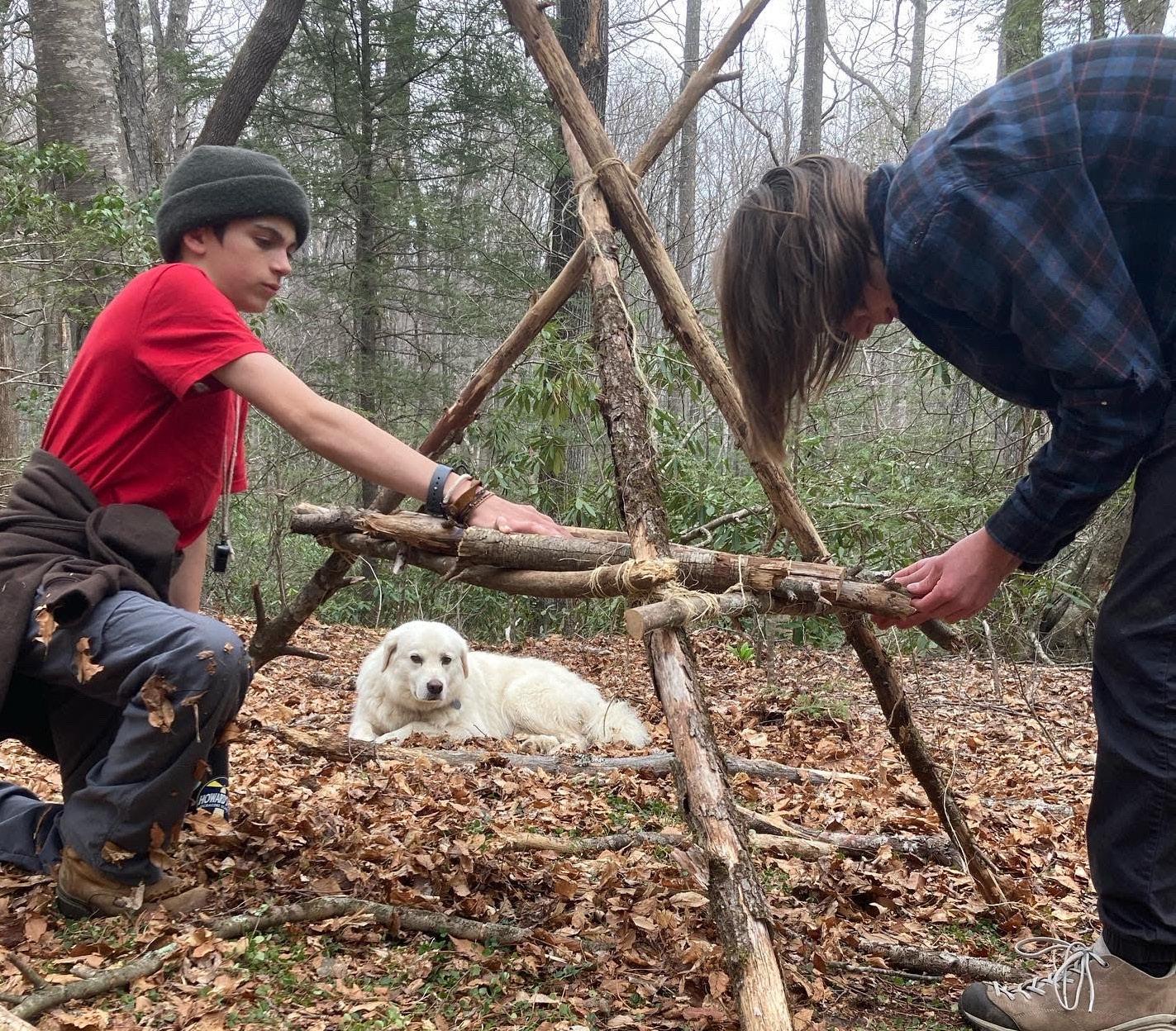
“ The beauty is that these skills are our human heritage, regardless of the color of your skin or your religion. This is our common ground; where we all came from.- Nathan Roark
Born out of a passion for the land of the Southern Appalachians, Nathan Roark established Buffalo Cove in 2000 to offer outdoor education programs and summer camps.
Roark grew up in downtown Atlanta, and knew at a young age it wasn’t where he wanted to live as an adult. Having attended summer camps in WNC himself, he saw firsthand the power of what summer camps can do while simultaneously falling in love with the forest, ecosystems, and natural history of the region.
As a teen, Roark began assisting a childhood mentor as an outdoor educator. His focus was earth skills, wilderness survival, and strengthening ties to natural resources. As his skills developed, he learned he was holding onto a skillset that was pretty rare, even teaching these as a junior counselor at a Brevard summer camp.
“I saw that this was something so rare and something that is so needed,” Roark said. “We need to hold onto these skills, and we really need to keep these old ways alive.” In his early 20s, Roark began to feel he needed to seek opportunities to teach these skills to children that don’t have the advantage of attending typically pricey overnight summer camps in the area. With a couple of partners, he was able to raise the funds and start Buffalo Cove, and
began offering summer camp to groups of inner-city foster children.
“We would fly kids from the South Florida area to Western North Carolina and spend a week or two weeks developing community and developing skills,” Roark said. “The beauty is that these skills are our human heritage, regardless of the color of your skin or your religion. This is our common ground; where we all came from. What I saw was this magical opportunity to just explore being a human being in a world that was trying to section us off and break us up.”
While many of WNC’s summer camps offer a variety of outdoor activities, Buffalo Cove’s focus is rooted in living closely with the Appalachian Mountains. Attendees participate in fire crafting, woodworking, knife working, breaking rocks to make arrowheads, blacksmithing, basketry, and other bush-crafting and wilderness survival skills. Camp leaders take risk management very seriously, and strive to open doors to how to safely explore situations with potential dangers rather than presenting off-limits scenarios.
“We want the ability to have conversations, and know that there is no possibility of a child being a shadow in the corner,” Roark said. “With our small groups and welltrained counselors, we are able to take our shoes off and walk safely in a creek because we have the numbers to do that safely. Some adults will tell children not to ever touch a knife, but we will say, ‘hey, pick it up, let’s use this’ and we can teach them how to use it in a safe and responsible manner. That’s how we want to approach education.”
For the first six years in operation, Buffalo Cove’s sole clients were children in foster care. Roark said many of these kids had never left their neighborhood before, and arriving at Buffalo Cove was “about as foreign as they could imagine.” While some shared some fear, uncertainty, and distrust upon arrival, after a few days to a week, campers would express they felt safer than they ever had before.
“This is the transformation of what it means to be a part of a meaningful community,” Roark said. “We’re all out here and we’re all accountable to each other. We’re learning skills and interacting in real human ways. No one is trying to put on a façade. We’ve created the environment where everyone feels they fit in; they felt the trust, the warmth, and the realness, and that transformation was magical.”
As funding became challenging to acquire, Roark and his partners realized they needed to branch out to keep the camp program available to foster kids. In addition to summer camps, Buffalo Cove offers a calendar of custom-designed educational experiences for some charter schools in the Boone area and a community school in Brevard. Lessons with Buffalo Cove fill the Outdoor Education component of these schools’ curriculum, and students grow with the programs that complement what is being studied in the classroom.
Summer camp programs are also offered to the public, though Buffalo Cove still prioritizes its mission to serve foster children. Money raised through donations, fundraising, and some of the profits from other programs continues to support those coming from disadvantaged situations.
“We are learning lessons about the history of our area, about certain plants and animals, and hard skill sets, but more than that, we are fostering a deeper connection with the natural world that creates appreciation and love,” Roark said. “We are able to send kids off that not only feel safe and confident in the woods, they also have an appreciation of the outdoors. They have created a foundation of teamwork, and we hope they take those lessons and put them into real-world applications, which I think is really special.”
—
Buffalo Cove Outdoor Education Center offers education workshops, adventure experiences, and summer camp programs. Learn more at BuffaloCove.com.

Efficient cash flow management is crucial for the survival and growth of any small business. It ensures the company has enough liquidity to cover its operational expenses, pay its debts, invest in growth opportunities, and weather unexpected financial challenges.
Small businesses often operate with limited resources, making effective cash flow management even more essential. Here are the key strategies small businesses can implement to manage their cash flow efficiently.
One of the fundamental steps in managing cash flow is to develop a detailed cash
flow forecast. This involves projecting future cash inflows and outflows based on historical data, market trends, and upcoming expenses.
A well-constructed forecast helps business owners anticipate potential cash shortages and take proactive measures to address them. Businesses can adjust their spending and investment decisions by identifying peak and lean cash periods.
Small businesses should establish a routine for regularly monitoring and tracking their cash flow. This could involve weekly or monthly reviews of cash flow statements to ensure that actual performance aligns with projected figures. Continuous monitoring lets business owners detect deviations early and make
“Continuous monitoring lets business owners detect deviations early and make timely adjustments to avoid cash flow crises.”
timely adjustments to avoid cash flow crises.
Efficient management of accounts receivable is vital for maintaining a healthy cash flow. Businesses should establish clear credit policies, set payment terms, and communicate them to customers.
Promptly send out invoices and follow up on overdue payments. Consider offering discounts for early payments or implementing late payment penalties to encourage timely settlements. Utilizing technology, such as accounting software or invoicing tools, can help automate and streamline the invoicing and collections process.
Managing accounts payable effectively can also contribute to better cash flow. Negotiate favorable payment terms with vendors and suppliers, and take advantage of early payment discounts if offered. Regularly review and analyze expenses to identify areas where costsaving measures can be implemented without compromising the quality of products or services.
Excess inventory ties up valuable cash that could be used for other business needs. On the other hand, inadequate inventory levels can lead to stockouts and lost sales opportunities.
Small businesses should strike a balance by implementing inventory management systems that help optimize stock levels based on demand forecasts. This prevents overstocking and frees up cash for other operational requirements.
Careful control of operating expenses is essential for efficient cash flow management. Analyze all business expenditures to identify areas where cost reductions can be made.
This might involve renegotiating contracts, outsourcing non-core functions, or leveraging technology to automate processes and reduce labor costs.
Establishing a cash reserve, a “rainy day fund,” is a prudent strategy for managing cash flow uncertainties. Small businesses should set aside a portion of their profits into a reserve fund that can be tapped into during lean periods or emergencies. This provides a financial cushion and reduces the reliance on external financing or credit during challenging times.
Despite careful planning, there may be times when a small business needs external funding to bridge cash flow gaps or fund growth initiatives.
It’s important to explore various financing options, such as business loans, lines of credit, or trade credit, and select the
option that aligns with the business’s needs and financial capabilities. However, it’s essential to manage debt responsibly and avoid overburdening the business with excessive liabilities.
Advancements in technology have led to the development of numerous cash flow management tools and software solutions. These tools can automate cash flow tracking, forecasting, and reporting, saving time and reducing the likelihood of errors. Additionally, they provide valuable insights that help business owners make informed decisions to optimize cash flow.
Small business owners should not hesitate to seek advice from financial experts, accountants, or business consultants. These professionals can offer insights and guidance tailored to the business’s needs. They can help interpret financial data, identify areas for improvement, and provide strategic recommendations to enhance cash flow management.
—

Ben Wann is the owner of CFO Consultants.
Learn more at CFO Consultants.net.
Education is something that can never be taken away from you. Whether learning happens in the form of a curriculum degree, certification, or continuing education, it is an investment that will always pay dividends at some time or another.
There is an increase in standardizing education within the craft beverage industry. As the work is very hands-on, students have to do the work in order to learn for themselves, and being guided is imperative to formulating a complete understanding of it. From science to creating new products to building customer relationships, education is the foundation of the work.
Flavor recognition is at the forefront of the craft. The science behind taste profiles and sensory recognition has evolved dramatically from the ‘map of the tongue’ of years ago. We know so much more about how senses relate to certain areas of your brain. Everyone’s taste and smell is different, and it takes practice to develop the vocabulary to describe flavor compounds that are adjusted and manipulated as specific beverages are crafted.
In addition to new science, new technology and new processes allow brewers to be increasingly creative. Students may have varying interests in different products, but benefits of cross training may come into play in surprising ways. New techniques like resting gin in a used cabernet barrel
or soaking a stout beer in a bourbon cask have come about, and aspiring brewers will need to understand what went on in that cask in order to add layers of flavor that make sense. A knowledge of multiple beverages really helps students diversify what they’re making after they graduate.
Diversification of the craft beverage industry in the region has exploded in the last 10 years, and education offerings must adjust to the market. Instructors must also have an understanding of where trends are headed. With such a concentration of craft beverage makers in the region and an increasing variety of what people are drinking, guidance is important in quickly learning and adapting to offer more options for consumers in search of new and different flavors and products. We’ve recently seen many producers branching out into new products and partnering on new collaborations. Things like hard seltzer were barely heard of when the Institute first began, and now some of these new processes have been indoctrinated into our curriculum. They have to be in order for makers to keep up with consumer demand.
Beginning with your behind-the-bar staff, the more educated an employee is, the more elevated a customer’s experience will be, and the more money the bartender and the company is likely to make. Smells, flavors, and tastes are often
related to recognition of a time and place in someone’s life. With guidance, those working in the craft beverage industry can leverage this connection to boost their business.
Educating your staff allows them to educate your customers about the products you’re making. Consumers are more knowledgeable than ever before with so much information right at their fingertips. When your staff are knowledgeable and passionate, it gets them more excited about what they are offering. They engage in good conversations with customers, fostering their knowledge as well as their memory, which builds brand loyalty and keeps them coming back.
Customers can pull out a can or a bottle and have a drink, and the sensory recognition allows them to remember the great time they had at that location. They will buy the hat and the T-shirt, and then you have a walking billboard. They’re more likely to come back, bring their friends, and enjoy their experience multiple times. It’s just part of good business
—

The Craft Beverage Institute of the Southeast at A-B Tech Community College specializes in educating professionals of the craft beverage industry. Tune into their Consuming The Craft podcast with Jeff “Puff” Irvin at ABTech.edu/News/Consuming-CraftPodcast-Hosted-Jeff-Puff-Irvin.

Years ago, I read a book called ‘Hiring for Attitude’ which discussed the importance of considering a person’s attitude and fitting into a company’s culture versus examining only the experience and skills needed for the position. While it’s great to hire someone with experience and skills, it is as important to hire someone with the right attitude that fits well into your business’s culture.
After years of hiring employees for my own company, I’ve discovered there are three key hiring tools that, in combination, create the best opportunity to hire the best candidate for your company.
Much of the work performed by office personnel is conducted via phone conversations. Having an interview over the phone can help you determine how
they come across to others on a call. Inperson interviews are also important so you can get a feel for their body language. Sometimes people may have strengths in one communication style or another, so conducting two interviews helps you understand the whole picture.
Allowing other office members to interview the potential new candidate can also be helpful. When the new hire will be working in an office with others, it’s helpful to see how the different personalities get along, and how the new hire will mesh with the existing company culture.
Certain types of roles are typically best suited for certain personality types. Personally, I use the DiSC model, which is a personal assessment tool used to determine an individual’s strongest personality style and if it fits with the role we are looking to fill..
For example, DiSC stands for (D) ominance, (I)nfluence, (S)teadiness and (C)onscientiousness. There are always exceptions, but I’ve found a sales position is best suited for someone who is a high ‘I’ with a ‘D’ above the midline, whereas a billing or administrative role is better suited for an ‘SC’ style. It helps to know a candidate’s personality when determining if they are a good fit for the position, because you can’t fit a square peg into a round hole.
I hate having to scramble to hire someone.
It’s stressful, and no good decisions are made when you’re racing around. I believe it’s best to invest in your staff before they are needed. Staffing your business with the right people can take a long time, so it’s much better to get started early. This may temporarily sway your payroll-torevenue ratio, but you have to have faith in your business and its growth projections.
Believing in your business plan and your projected growth helps you properly prepare. It’s much better to hire new staff, get them trained and comfortable, and have your whole team in place as your business ramps up. This allows you to grow into your staff rather than scramble and hire the first person that applies because you’re desperate for someone to fill a seat.
Once you have used these three tools, it is a good idea to chat with your team in case anyone identifies any red flags or concerns, but keep it simple. Sometimes you can do all the right things and it still doesn’t work out, but nine out of 10 times, it will. Sometimes you know it is or is not the right fit just from a gut feeling. Pay attention to that, don’t overcomplicate the process, and you’ll be able to find the candidate you and your clients will know, like, trust, and enjoy working with.
—

Jim
Smeaton is the President and Director of Client Care at Always Best Care Senior Services. Learn more at AlwaysBestCare.com/ Asheville.
I recently got a call from a leader with the challenge that no leader wants to deal with –determining if it’s time to fire a non performer. You know this story, as you have most likely been there as leaders.
You hire a person that comes highly recommended, and you are excited to have them on the team. You assign them a role or a territory, and you sit back and wait for them to excel in this new position.
The first month goes by and there’s no results from your new team member. That’s okay, you justify the lack of results to the fact that they are new, and after
all it is just the first thirty days. Then the second month goes by and again lackluster results. Again, you justify it by saying it’s just the second month and the results will come.
Then there you are three of four months down the road and still your “new” person is not performing at the level you had
hoped for. Now you are getting worried, and you wonder how to handle the situation and if you should fire this non performer.
When you are wrestling with the challenge of how to handle a non performer, the
When you are wrestling with the challenge of how to handle a non performer, the first challenge you need to deal with is you, the leader.
first challenge you need to deal with is you, the leader. Before you ever think about disciplining an employee or actually taking the drastic step of firing someone, you need to ask if you, as the leader, have done your job.
You can’t hold a team member accountable if you have not held yourself accountable. There are three very important questions you need to ask yourself before you expect others to meet your expectations.
More than sixty percent of disciplinary issues happen not because team members do not want to do a good job, but because you as the leader have not made your expectations clear. You and your team members need to be aligned on exactly what needs to be accomplished. Ensure they are aligned with the expected behaviors, results, and values.
Once the expectations are clear, then you need to ensure that your team member has the skills, tools, and resources to accomplish those expectations. Your job as a leader is to ensure your team members are well-equipped to accomplish and exceed their goals.
Once you have been clear on the expectations and provided the support and training, then you have all you need to determine if your underperformer is under performing because of a skill issue or a discipline issue. Are they under performing because they do not quite have all the skills and tools they need, or are they choosing to not do what you are expecting of them? Is their underperformance a discipline issue or skill issue?
Once you have done your homework as a leader, then you have all the information you need to determine if it is time to fire a non performer. Here are three signs you need to look for to ensure you are making the best decision for both of you.
The reason you set both behavior and results expectations is because it helps you determine whether your non performer is struggling from a skills perspective or is just choosing not to do the job – a discipline issue. A skill issue you can fix, a discipline issue you can’t. So if your non performer is not doing the behaviors you are asking, then it is time to let them go.
Even a top performer is not a productive member of the team if they do not align
with your values. This is one of the hardest fires you will ever have to make, but it will result in one of the most productive actions you take as a leader. When a team member chooses not to align and act according to your values, it is time to let them go.
And last but not least, it is time to let a non performer go if they are just on the wrong seat on the bus. In other words, their skills and abilities do not match the job. For example, someone who loves people and variety may never excel in a data entry position. And someone who loves data and numbers may struggle in a sales position. The great thing about figuring out someone is the wrong fit is you may not have to let them go, and can just find them a different position in your company.
Firing someone is never easy, but when you as the leader have done everything you need to do to help someone be successful and they are still underperforming, then taking the position to let them go is the best decision you can make for them, for your team, and for you. It is the best decision you can make to ensure you turn all of this uncertainty to your greatest competitive advantage .
—

Meridith Elliott Powell is an author, keynote speaker, and an expert in business growth, sales, and leadership. Learn more at MeridithElliottPowell.com.
In an effort to find a better work-life balance and allow more time for his passion for music, Tim Kuykendall took a step back in his role at Mail Box & Pack, moving from store manager to assistant store manager.
Kuykendall is in charge of running Musicians in the Round, the open mic night at Catawba Brewing Company on Asheville’s South Slope, and has been doing so for eight years. He said in this role, he is more of an emcee than a musician, but he has always loved playing and writing music.
While his job is not necessarily stressful, any job can have tense moments. Things not going as they should can cause the pressure to mount, but he loves working with people, especially as customers and coworkers become friends.
“Most musicians really love people,” Kuykendall said. “Playing in front of other people can also be stressful, but the stress around that decreases over time. Early in playing music, we question ourselves about our abilities, harmonies, and rhythms, but we go through it and are glad and proud we did it, unlike work, where the purpose of going through the stress is to get paid.”
For Kuykendall, music has always been a way for him to get out, have fun, and hang out with friends. Music has helped him maintain his balance, especially during his college years. Having a way to relax helped him to keep his focus during his studies. Since college, music has grown into a side hustle. He earns some pay for his hosting role, and plays with other musicians in benefit gigs for area nonprofit organizations.
Playing live two to three times a week, his passion has grown through adulthood and has continued to be his main way to relax.
“Hosting open mic nights on Mondays is a great way to start my week off right,” Kuykendall said. “I also get to hang out with all my ‘brothers and sisters’ there, and some of them even call me ‘Cousin Mike’. They make me crazy like a family does, and I love every one of them, and I love the trajectory they are on.”
While many musicians have goals of a full, professional musical career, Kuykendall is happy with his open mic nights and playing with friends in several bands. He used to have his own band called Tim & Friends, and said bands come and go, but he loves to hop in and play when and where he can. He also likes playing music across several genres, not wanting to be defined by only one.
“No musician wants to be held in a box,” Kuykendall said. “It’s important to listen with your heart and to the feeling you get when you hear the music you like.”
Kuykendall was in his 30s before uncovering what his music style is all about. He said now collaboration is key to having a more realistic world view as a musician. The most important thing is being in the community without overpromoting, and having good friends and role models in his musical work.
Music has helped Kuykendall to find his own voice, and helped boost conversational confidence. He looks for ways to bring music into his business life, sharing music trivia at Chamber events and enjoying musical conversations at networking events.
Finding a common ground through conversations about music helps people relax and find each other’s sense of humor. Kuykendall has professional relationships with many people who own their own business. Many of those entrepreneurs live a rigid, busy life, and he said casual conversations about music help “lubricate the joints” for both parties to the conversation.
“It helps bring connections in the business world,” Kuykendall said. “Everyone has their own soundtrack, and eventually, people’s soundtracks will overlap. They are good conversations to have; it’s fascinating and fun and a good way for people to connect.”
—
Tim Kuykendall is the Assistant Store Manager at Mail Box & Pack, and runs Musicians In The Round at Catawba Brewing Company. Learn more about Catawba Brewing’s events at Facebook. com/CatawbaSouthSlope.





Award Winning Presenter, Entrepreneur, and ActionCOACH Business Coach
Bill is currently one of the top ActionCOACH business coaches in the world, speaks on a wide range of business topics, and loves to teach business owners how to build “commercial, profitable businesses that work without them.”
Bill lives in Montreat with his wife of 38 years, Lynn. They have two grown sons. In his spare time, Bill enjoys golf, fly-fishing, reading books on business and theology, and doing anything outdoors with his sons.
Schedule a Free Business Coaching session with Bill Gilliland to get started.

828-348-1787
BillGilliland.ActionCoach.com

Sr. Commercial Loan Officer, United Federal Credit Union
As the Senior Commercial Loan Officer, Nick has more than 12 years of financial industry experience. Prior to joining United, Nick was a VP of Business Banking at First Citizen Bank. He has a degree in accounting and corporate finance from Western Carolina University and is a graduate of the North Carolina School of Banking at UNC Chapel Hill.
Nick lives with his wife and two daughters and has served with the NC Young Bankers Association, the Brevard Chamber of Commerce, and Pisgah Forest Rotary.
Cindy Kimmel is tackling the diminishing value of health insurance by bringing alternative health plans to local businesses. Her 15-year career in corporate employee benefits has given her valuable insights into the challenges of providing competitive benefits. With a focus on sustainable health plan solutions, Kimmel Benefits+ is committed to ensuring businesses can access affordable, highquality health plans. Holding a Master’s in HR and serving on the Western NC HR board, Cindy is a trusted advisor to her clients.
Contact us today to schedule an introductory consultation.

828-275-6230
Cindy@KimmelBenefitsPlus.com

Greg’s finance and economics degree from Mars Hill University means he’s fluent in cost savings and capital outlays. No matter your business goals, Greg’s telecom and network experience has given him a deep sense of appreciation of the powerful technology at the heart of Vistanet’s services and how it can help your company thrive.
828-708-6548
NIosue@UnitedFCU.com

Greg’s professional experience includes: Inspecting, studying, and stress-testing every single Vistanet phone— ensuring that businesses, like yours, receive the most feature-rich and reliable tech on the market today.

828-348-5366, Ext. 304
grobel@vistanet.co












Tuesday, April 9
Caldwell Women’s Forum Connect & Grow Expo
4:00 - 8:00 PM
J. E. Broyhill Civic Center
Join the Caldwell Chamber for heavy hors d’oeuvres, a panel discussion of women in leadership, and an opportunity to support women owned and led businesses at a vendor expo.
Wednesday, April 10
2023 Philanthropic Study
11:30 AM - 1:30 PM
The Ivy Building, A-B Tech
Holland Dunn will provide key insights from the 2023 Bank of America Study of Philanthropy: Charitable Giving by Affluent Households.
Wednesday, April 17
WNC Career Expo
9:30 AM - 4:00 PM
WNC Agricultural Center
An opportunity to promote career opportunities for job seekers in advanced manufacturing, technology, health care, tourism, professional services, and other high-growth industries.
Thursday, April 18
SCORE: A Cautious NonTechnical Introduction to AI and its Impact on Your Small Business
11:00 AM - 1:00 PM
Virtual, A-B Tech Small Business Center
Learn how Large Language Models can be used to help you with your small business.
Tuesday, April 23
Business & Professional Women’s Luncheon
11:00 AM - 1:30 PM
Blue Ridge Community College Conference Hall
Join the Henderson County Chamber to hear speaker Molly Grantham and the presentation of the ATHENA Award.
Thursday, May 2
Mountain BizWorks Orientation Session
10:00 - 11:00 AM
Mountain BizWorks
Learn more about Mountain BizWorks’ small business lending and learning programs.
Friday, May 3
Chamber Challenge
4:00 - 6:00 PM
Asheville Area Chamber of Commerce
The Asheville Chamber’s Annual 5K is designed to promote community wellness through friendly competition between businesses in the Asheville area.
Thursday, May 16
WWBC 10th Anniversary Gala
5:30 - 9:00 PM
The Venue
The Western Women’s Business Center will host their 10th Anniversary Gala to commemorate the achievements, growth, and journey of the past decade.
Thursday, May 23
How to Create and Present a Winning Business Pitch
5:30 - 7:30 PM
Virtual, Blue Ridge Community College Small Business Center
This seminar will prepare you to verbally present your business for funding or to create interest.
Wednesday, June 5
Smart Series: Photos as Stories
12:00 - 1:00 PM
Learn about composition of photos and videos and how to use them to tell your story.
For more events, costs, registration links, and details, visit WNCBusiness.com/Calendar.





